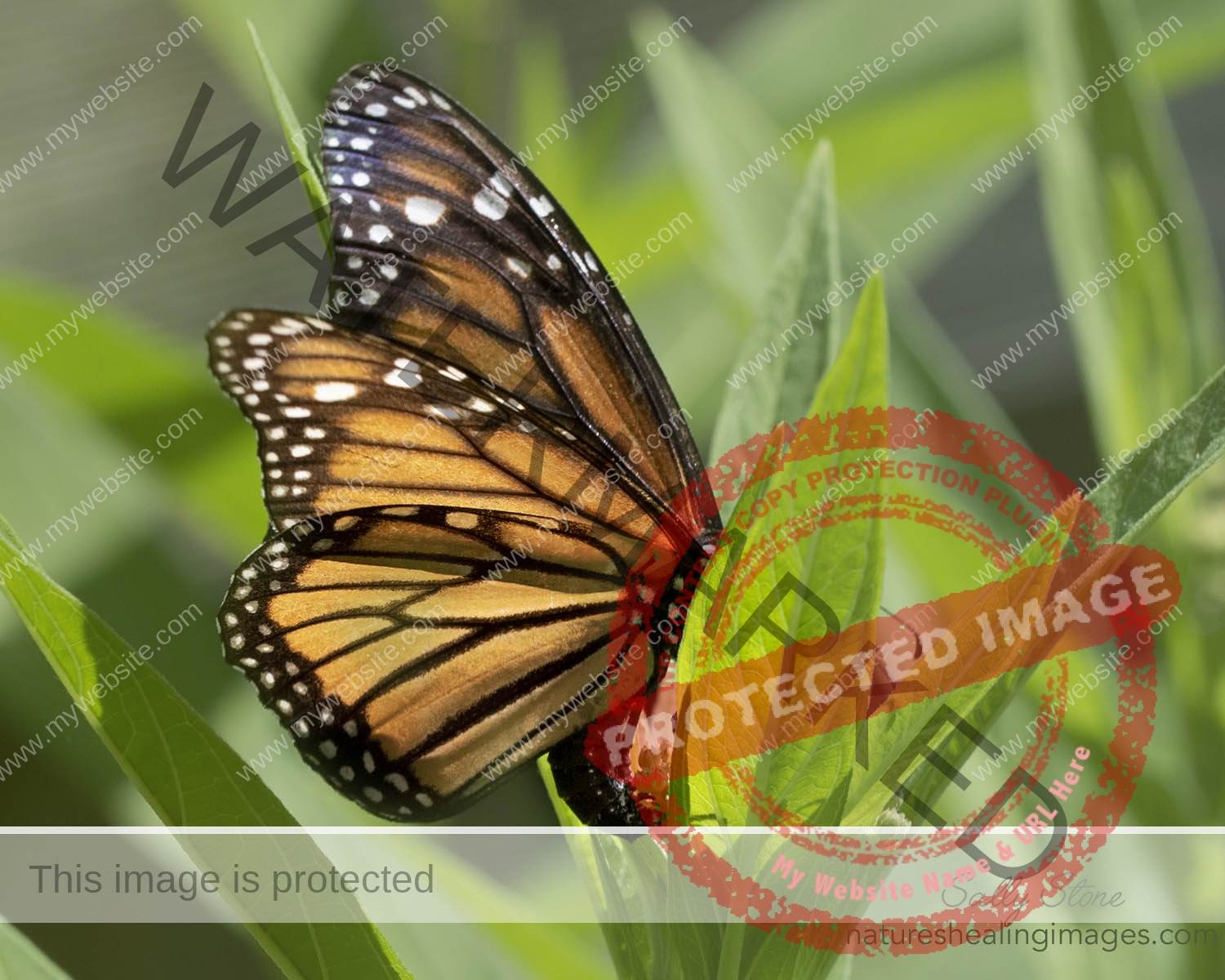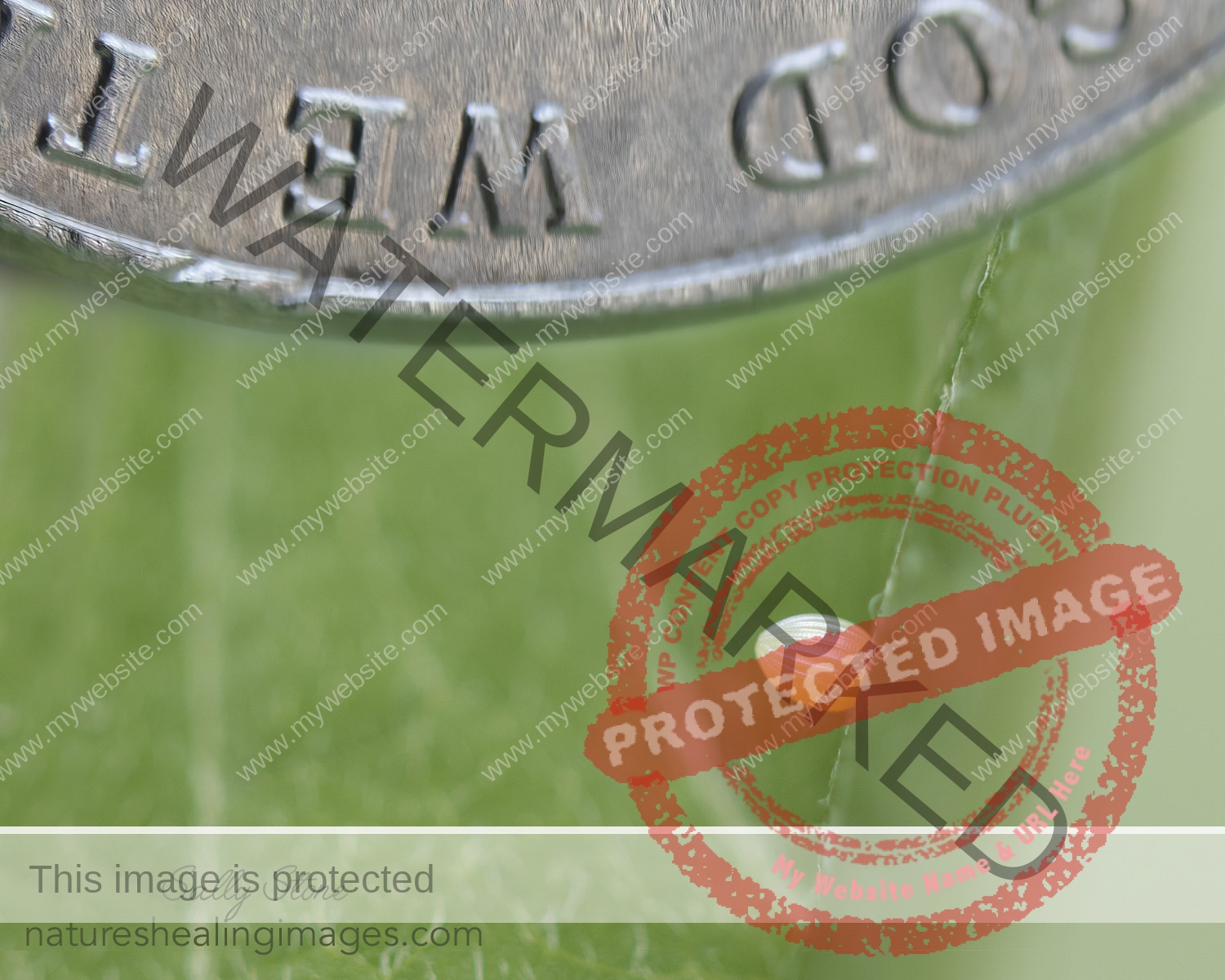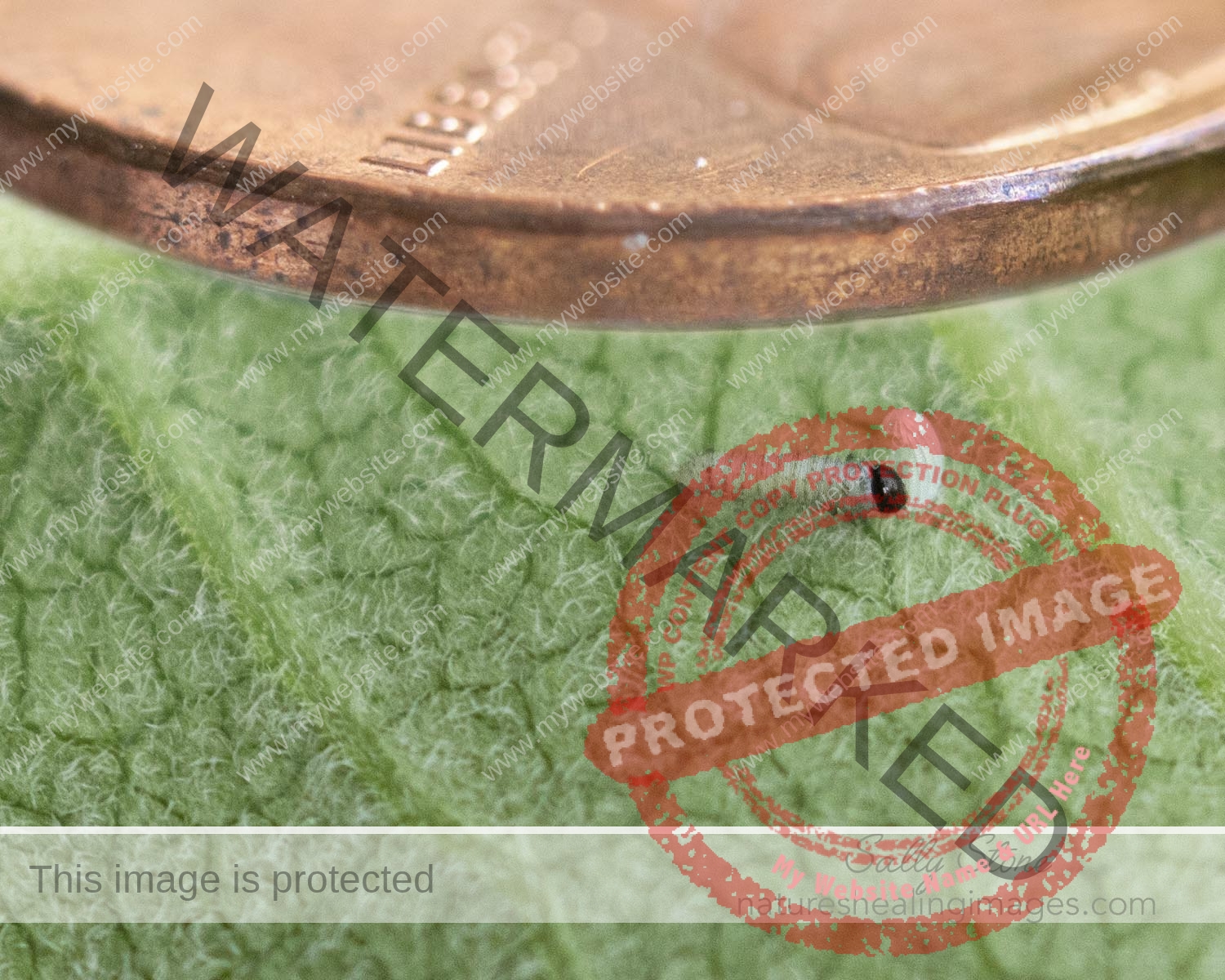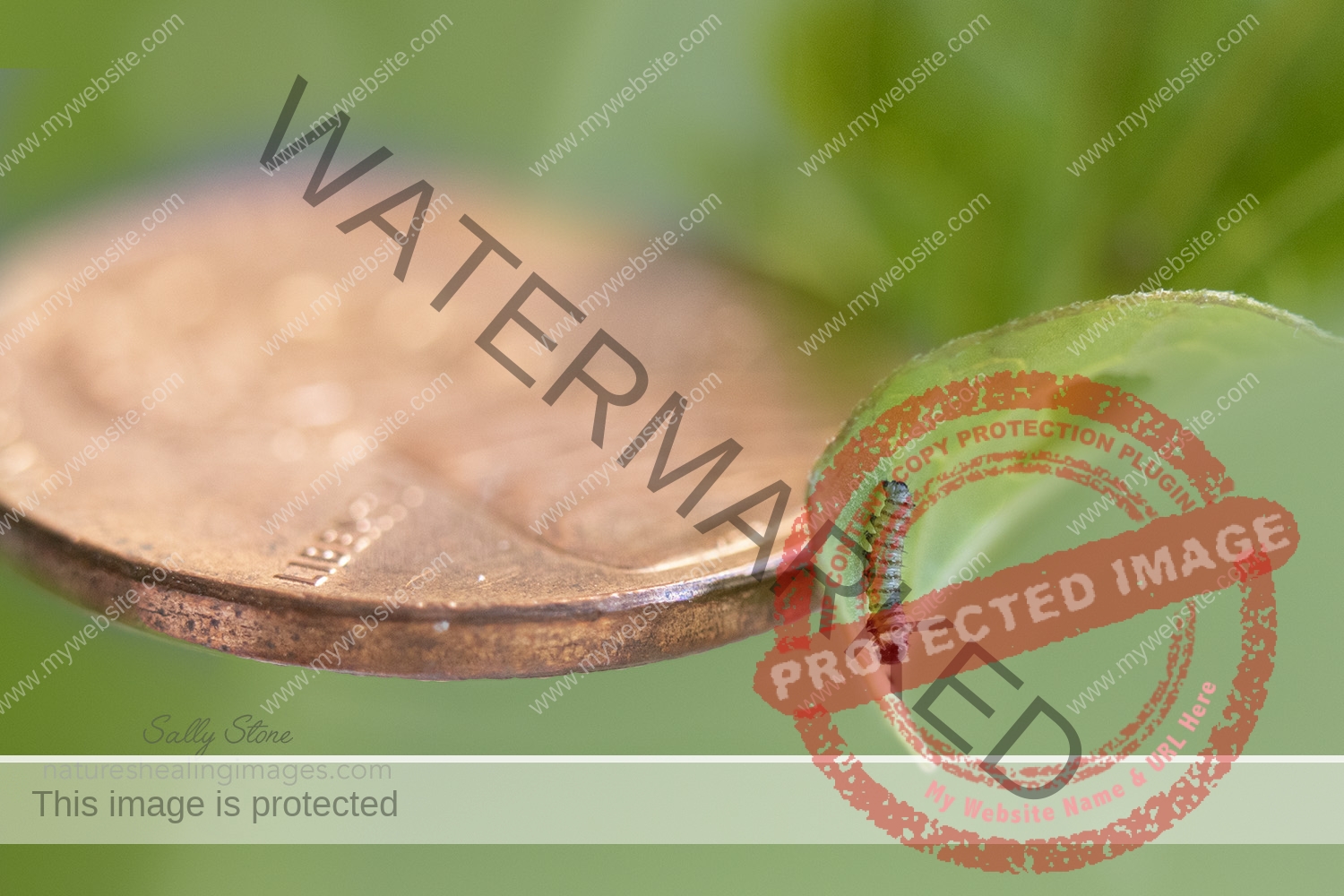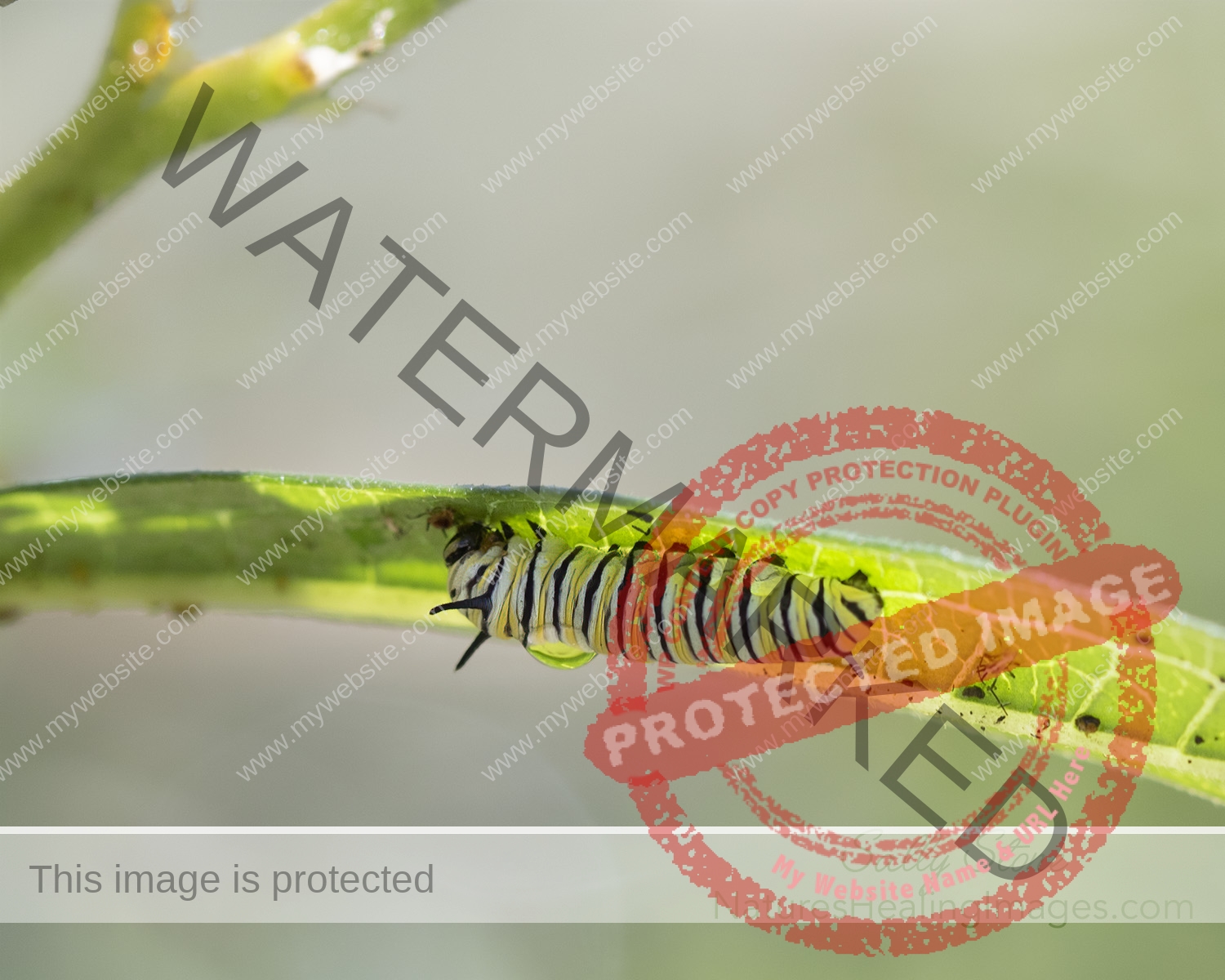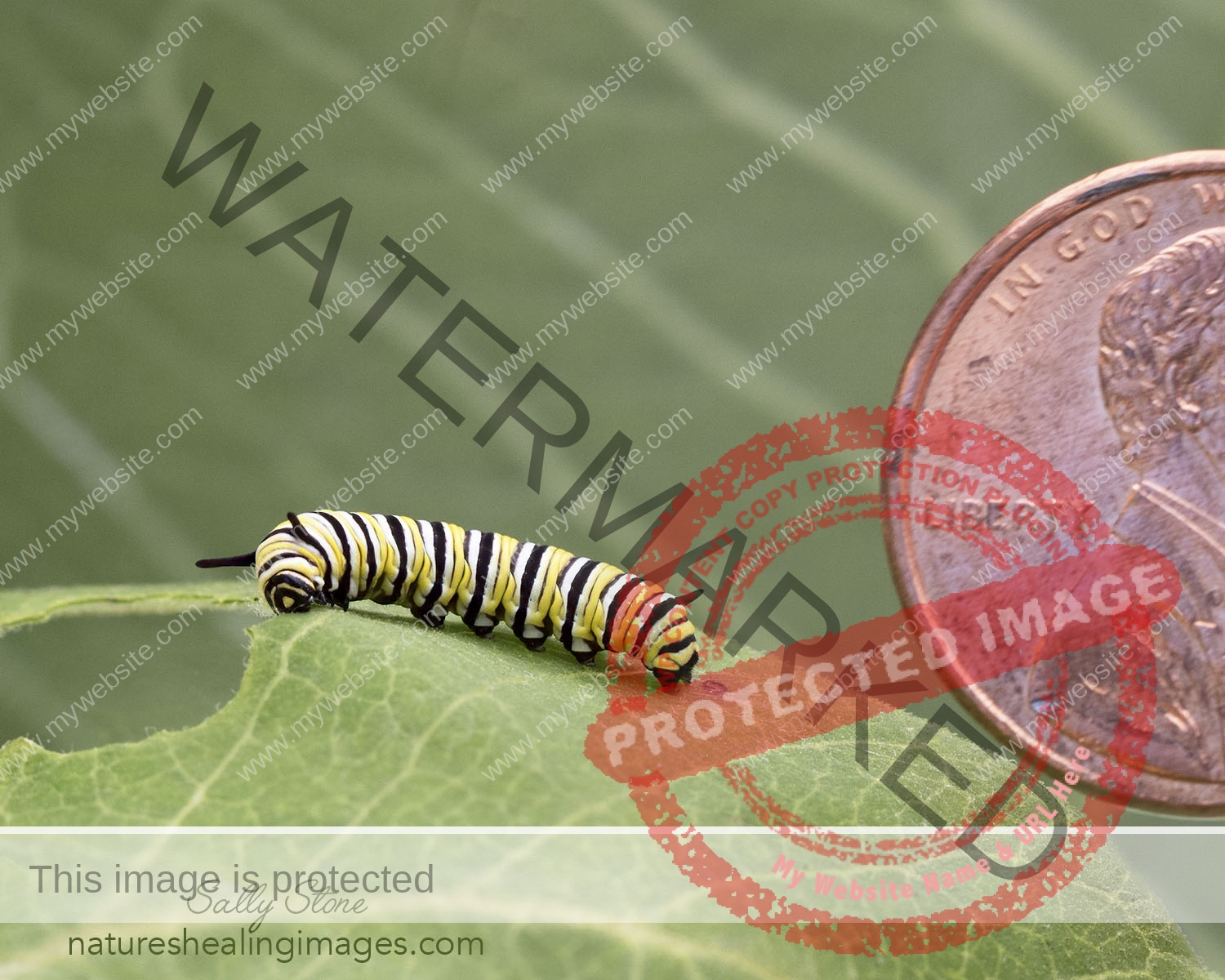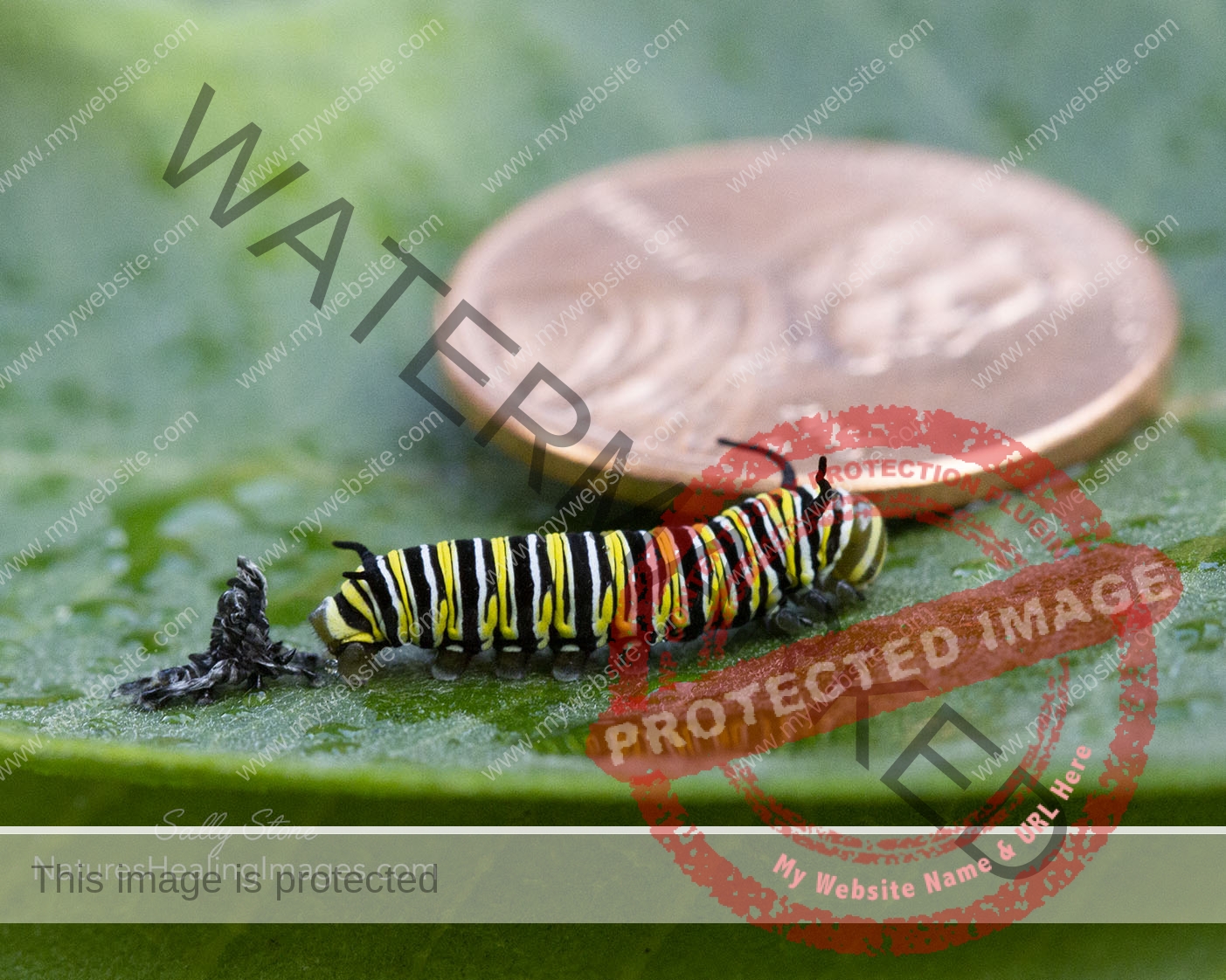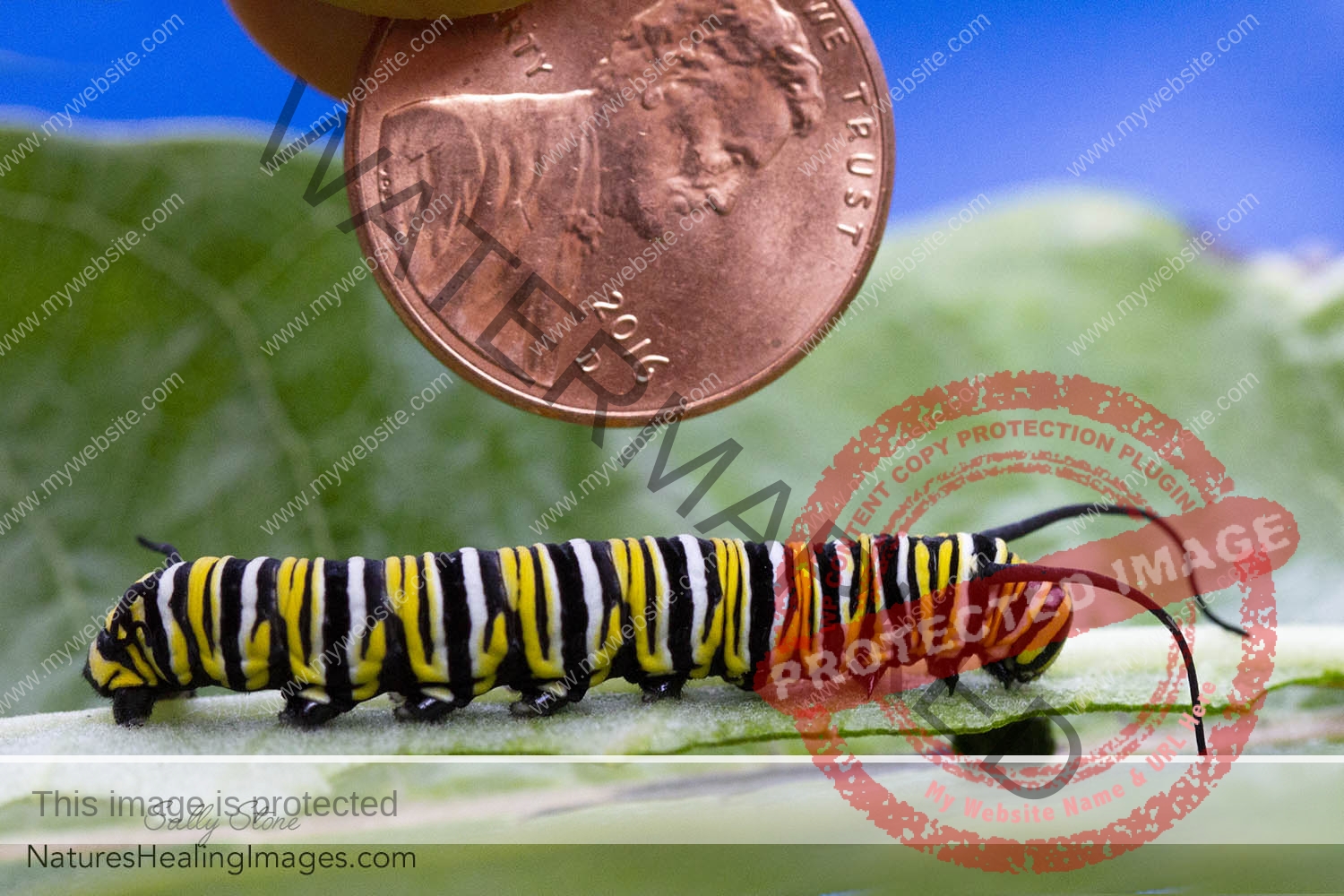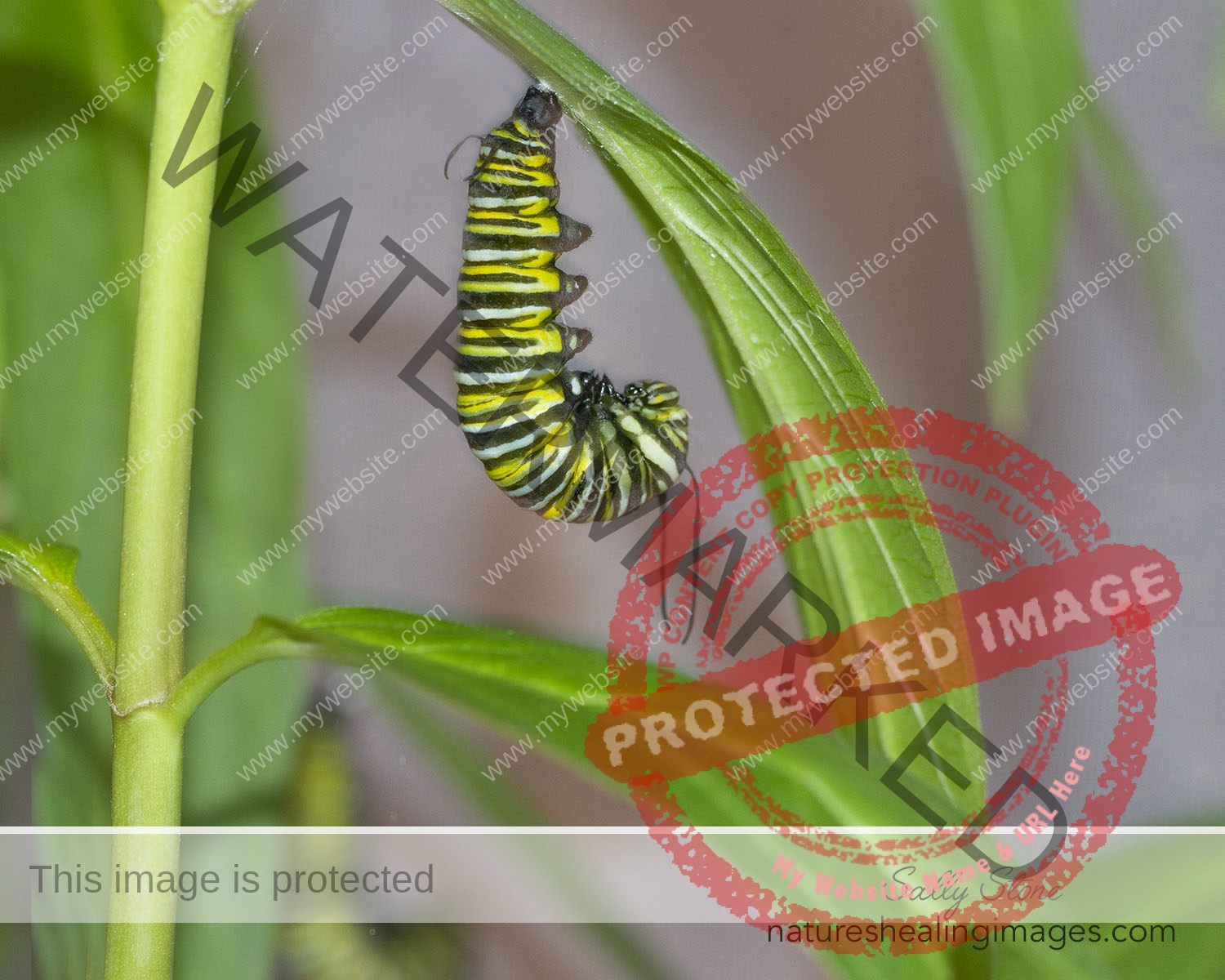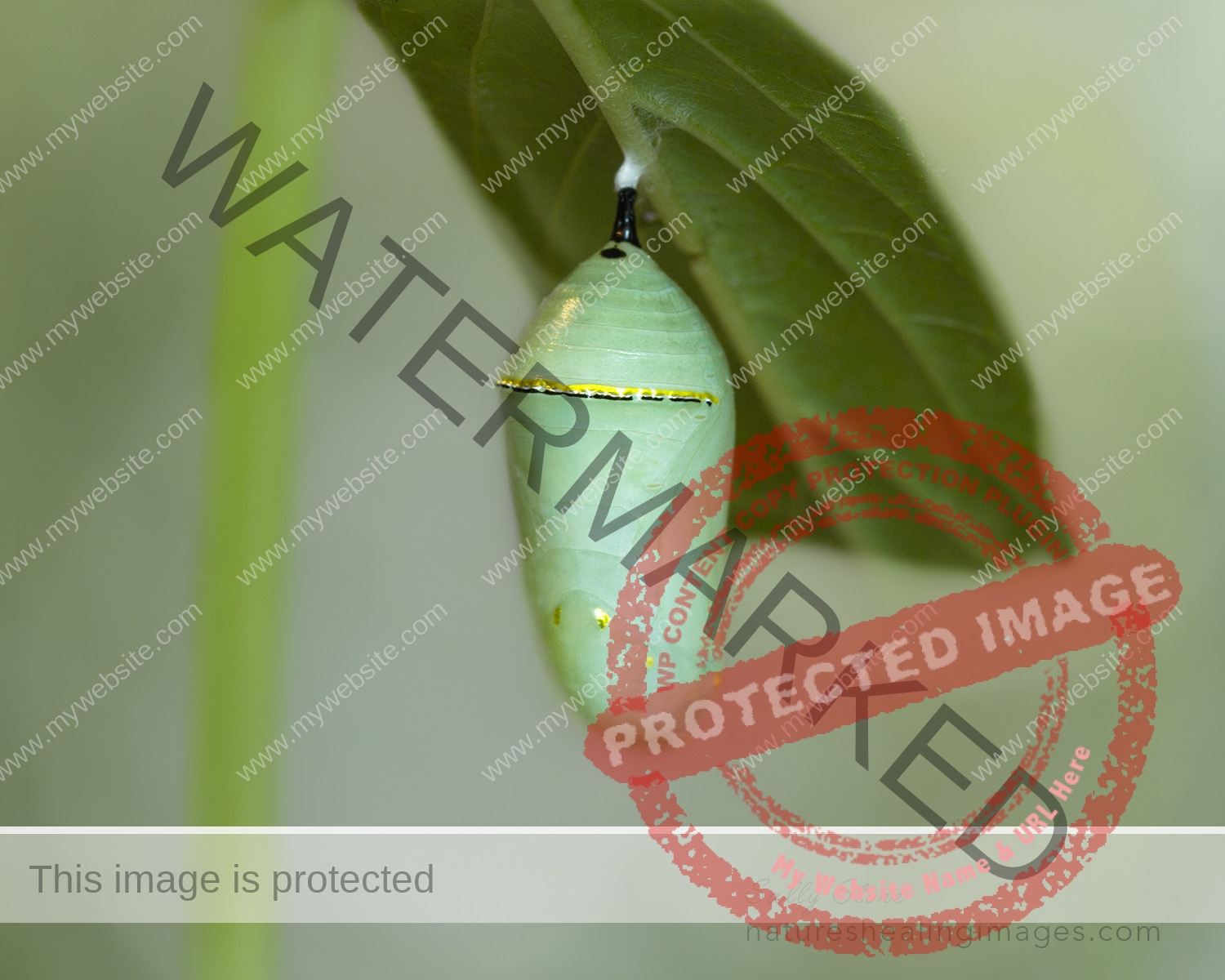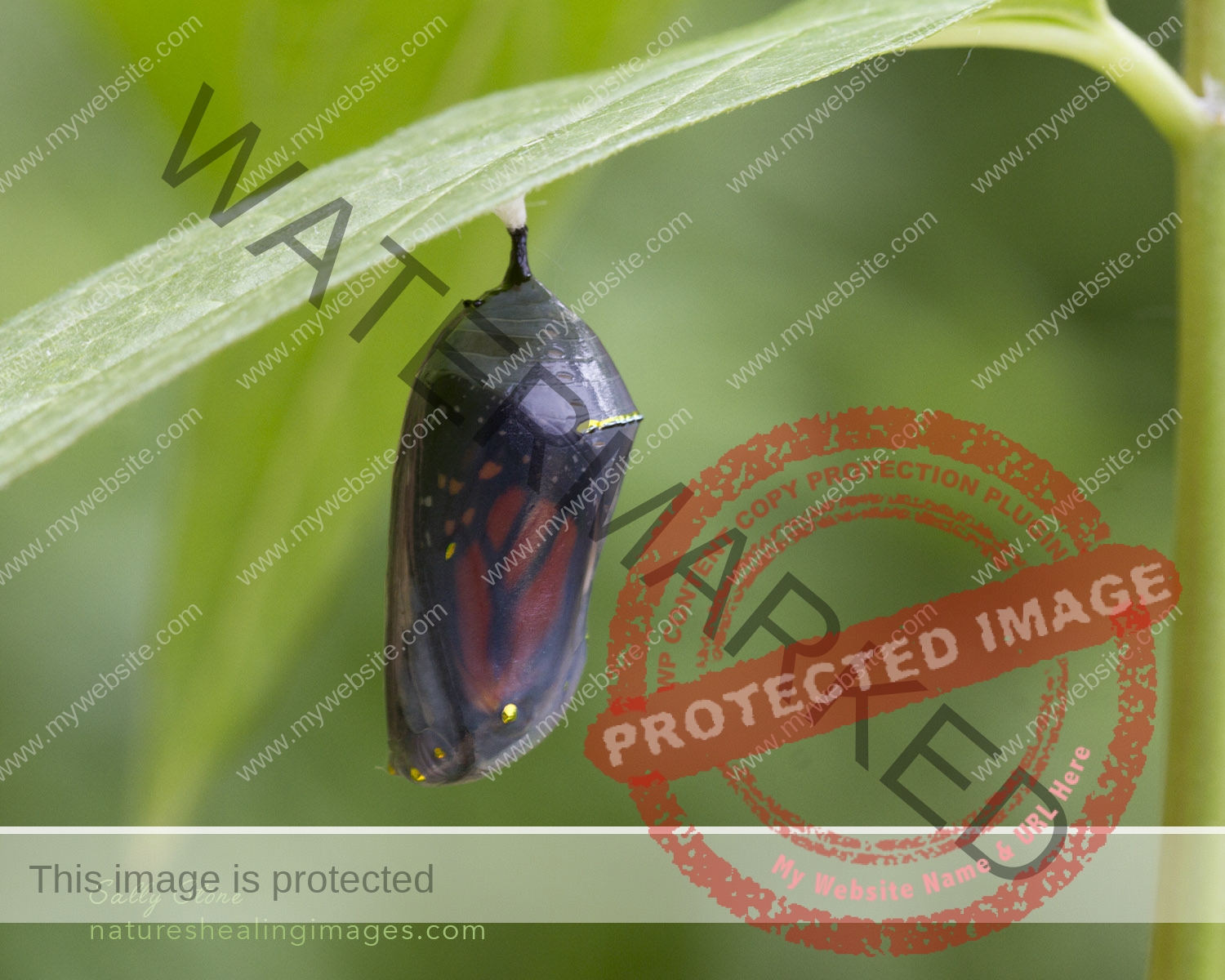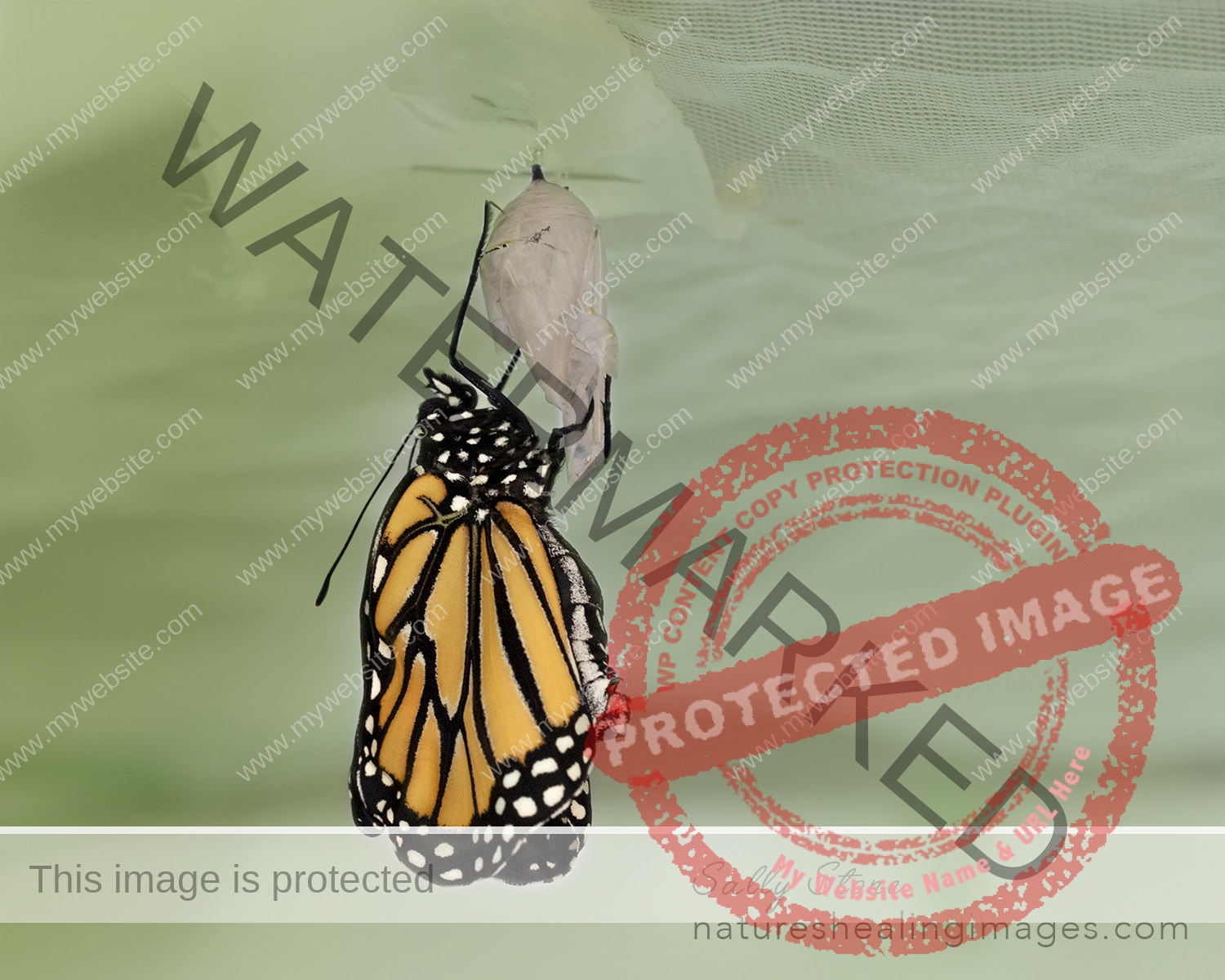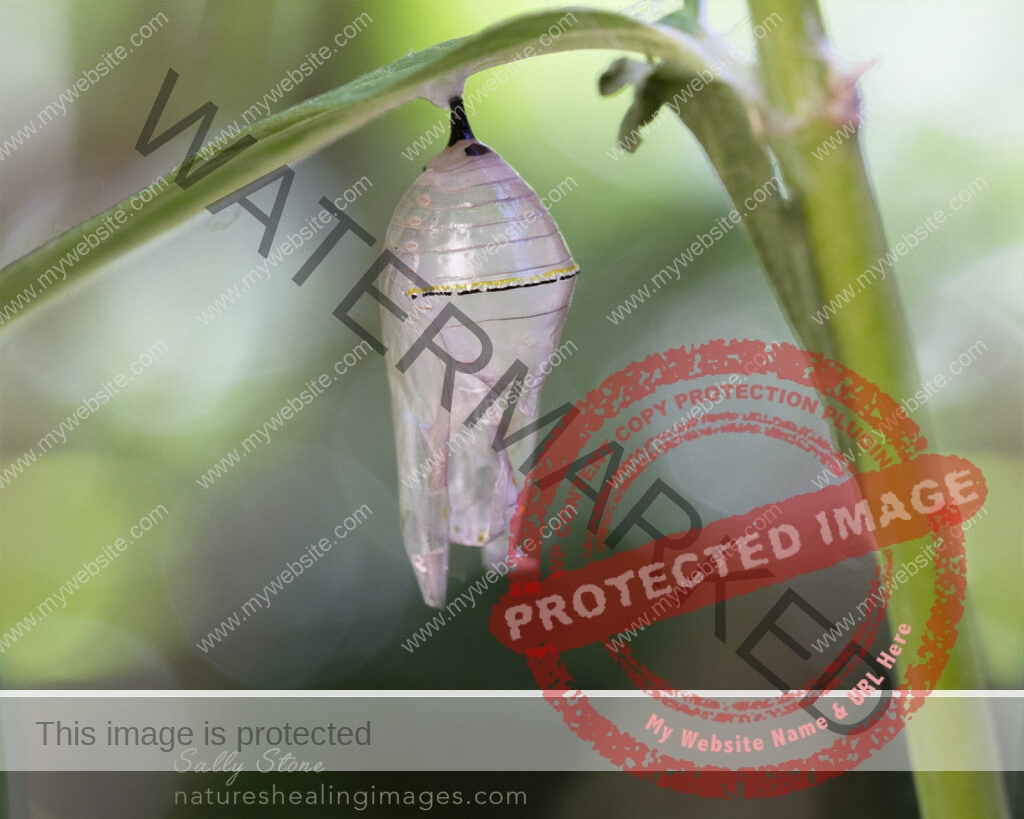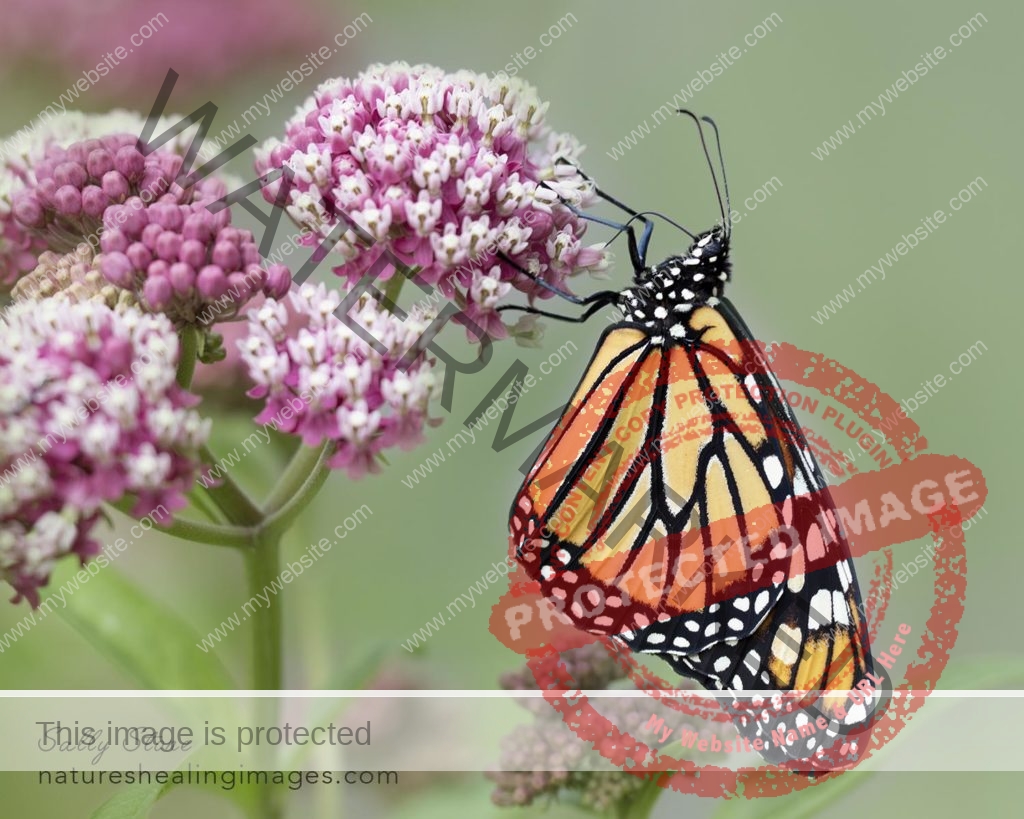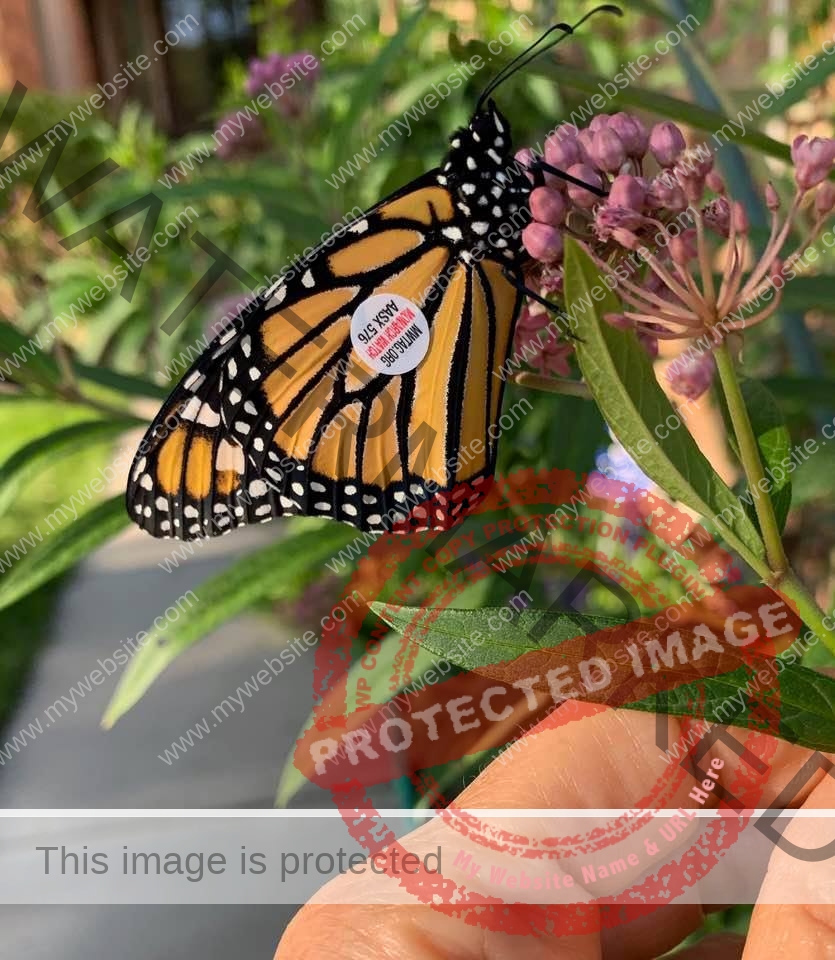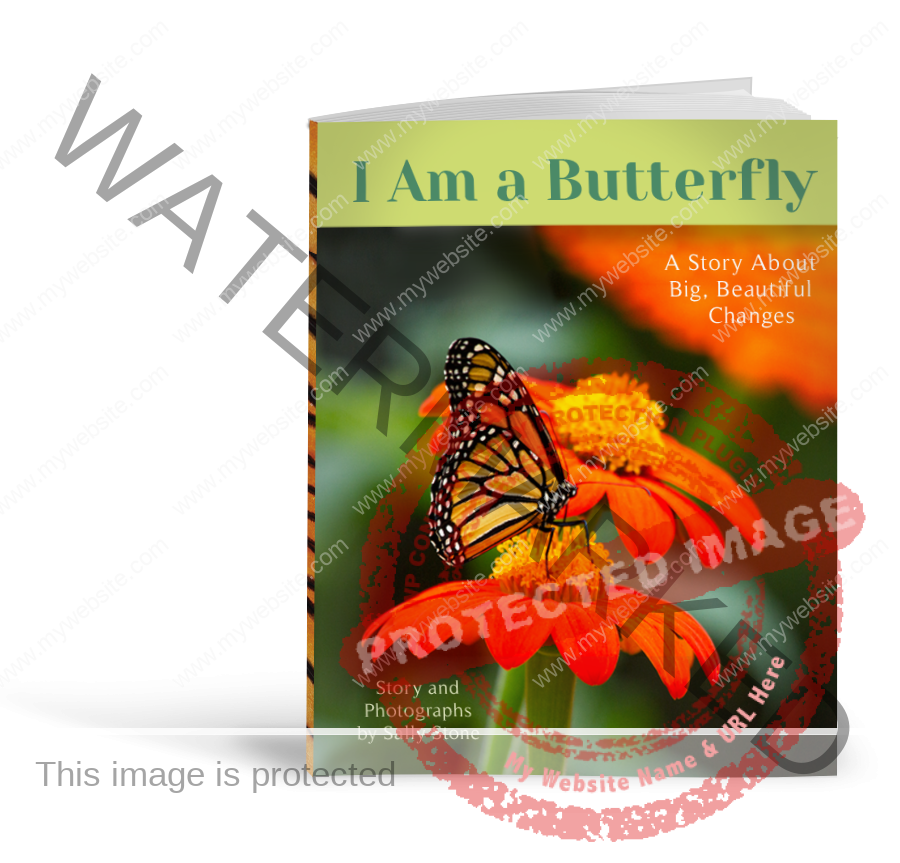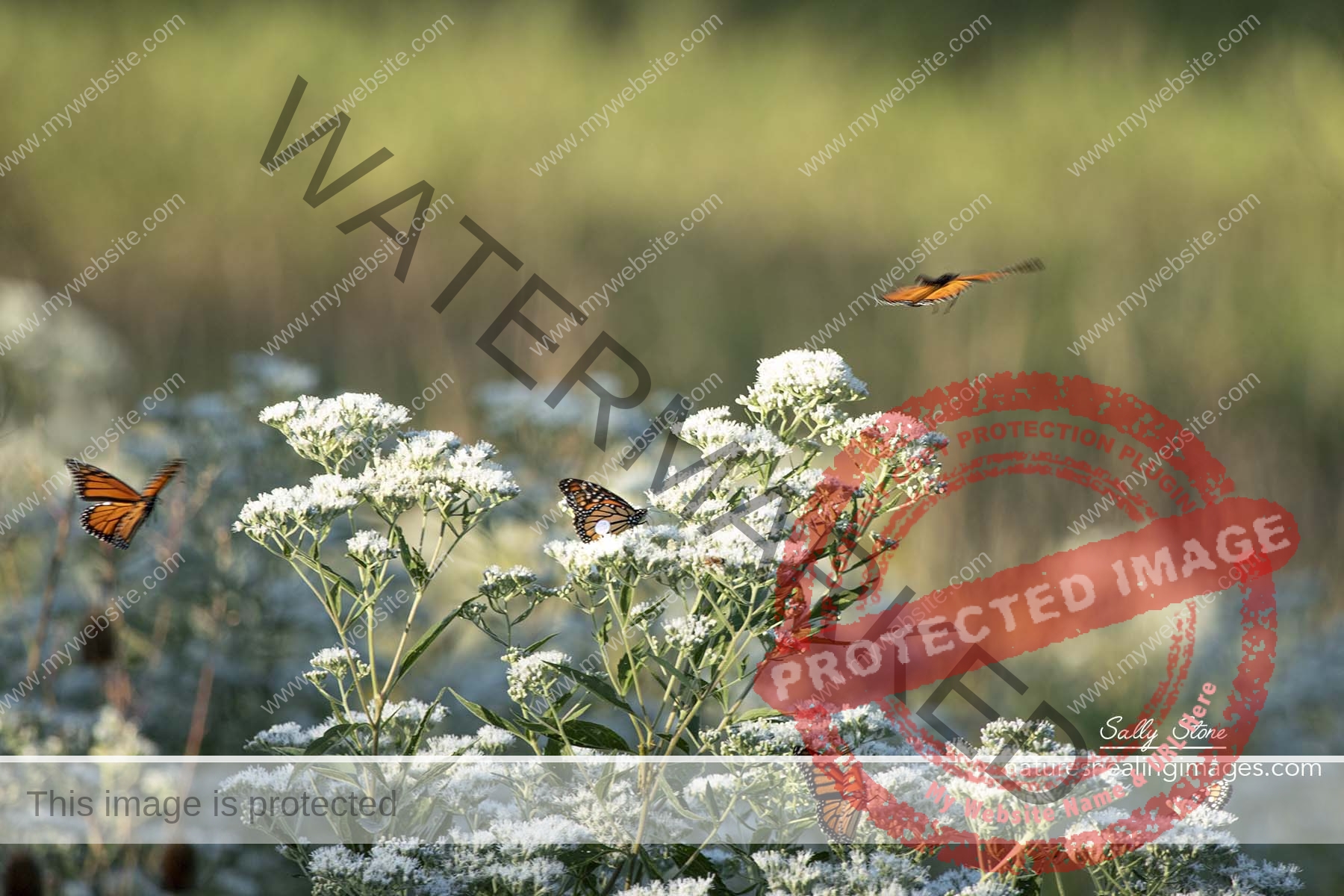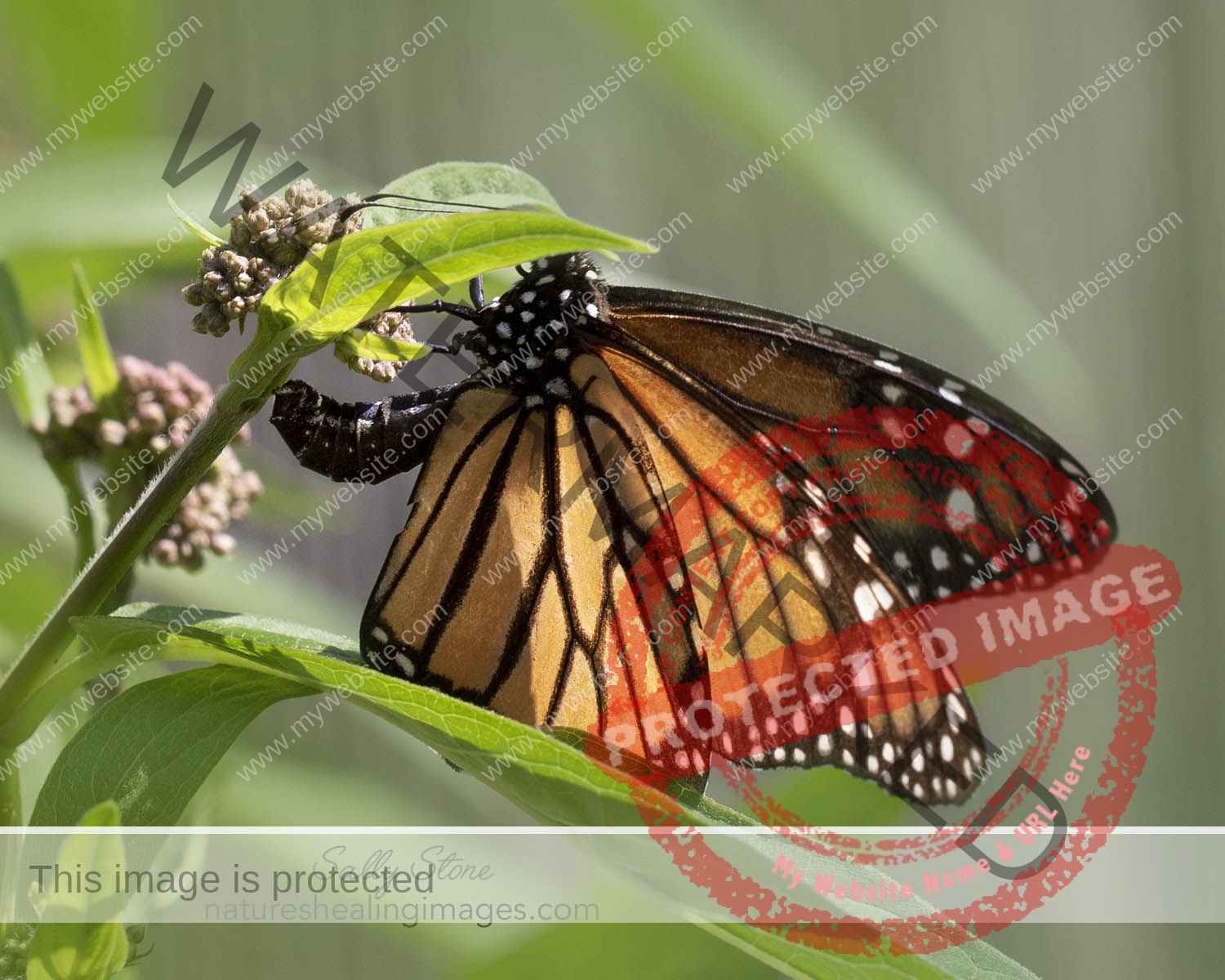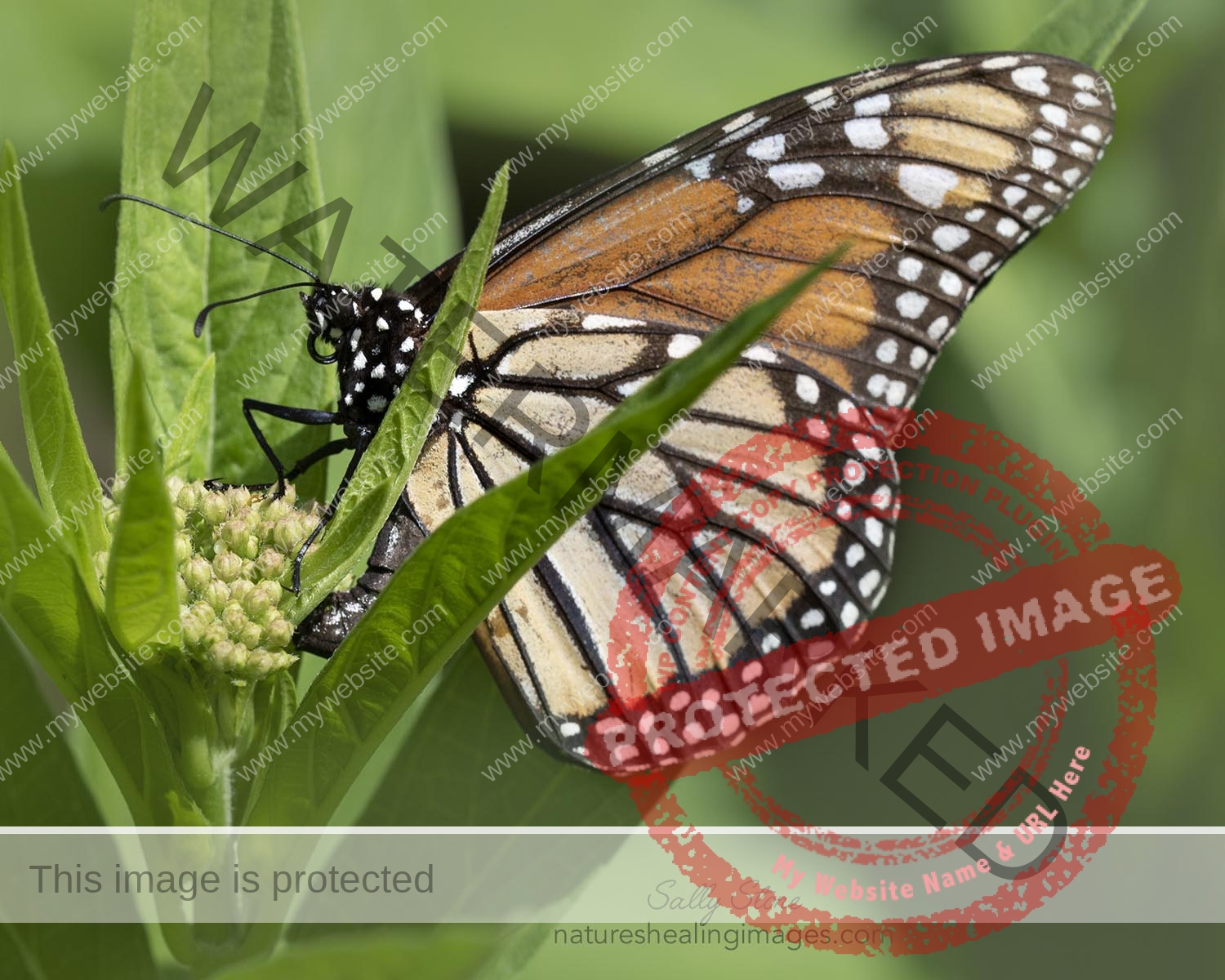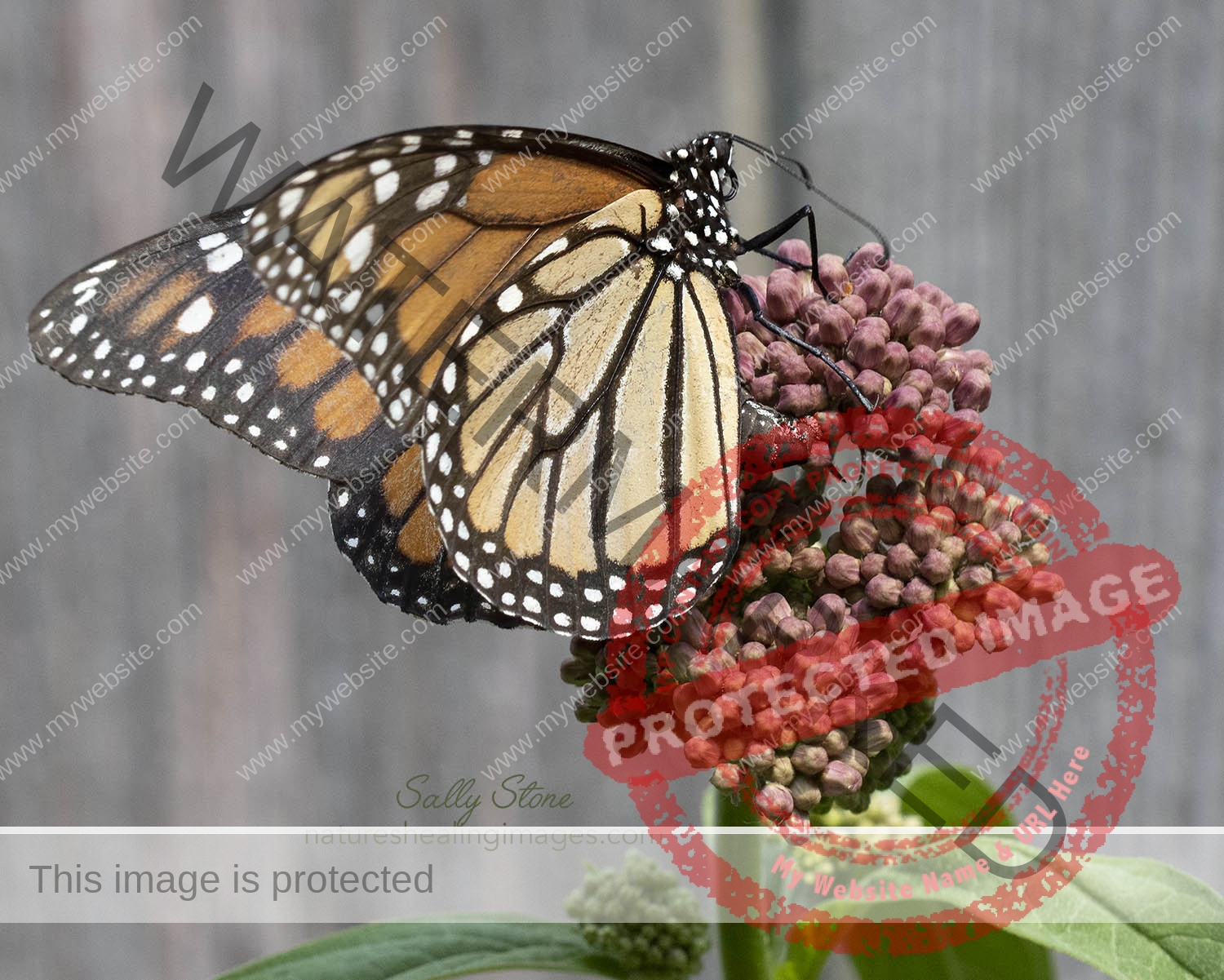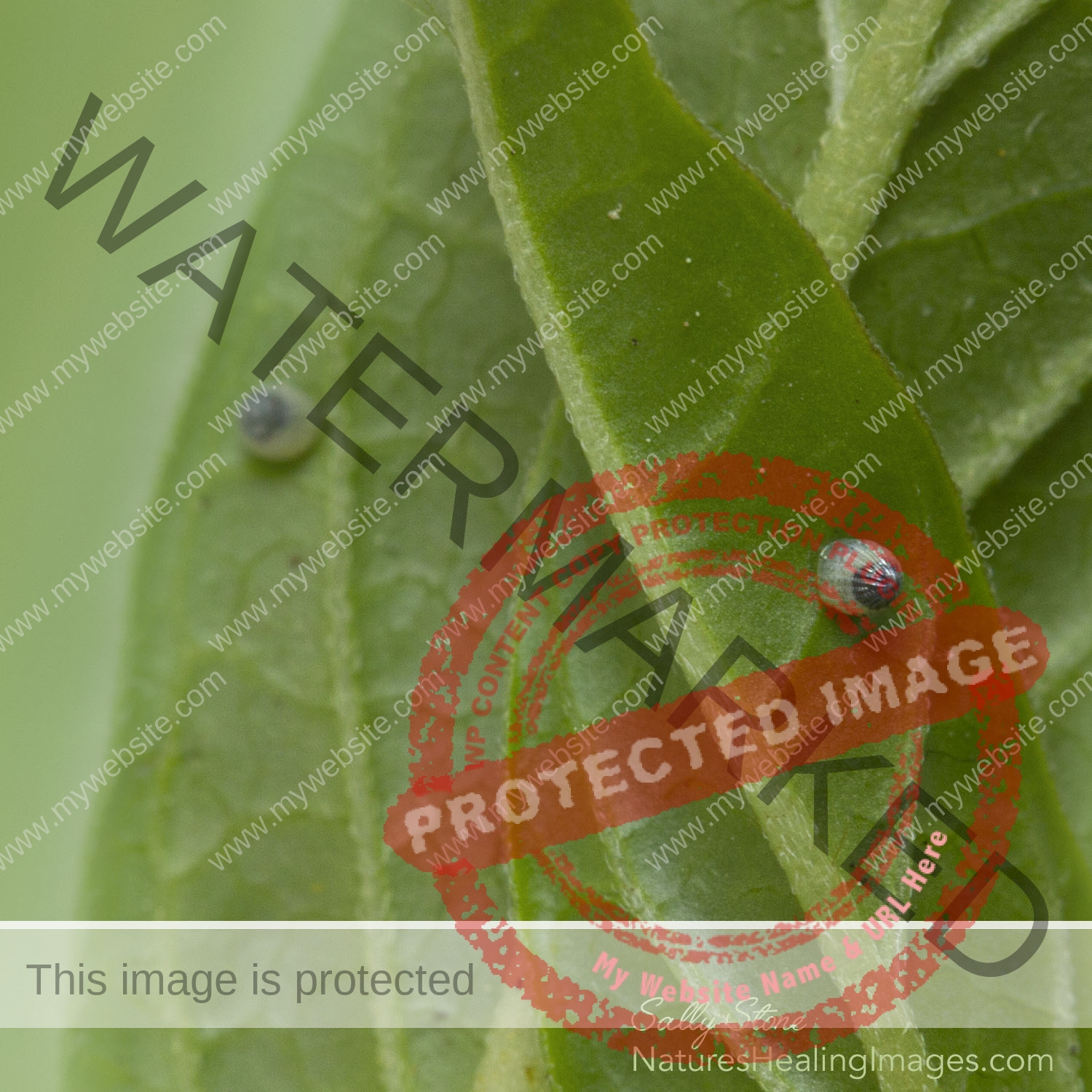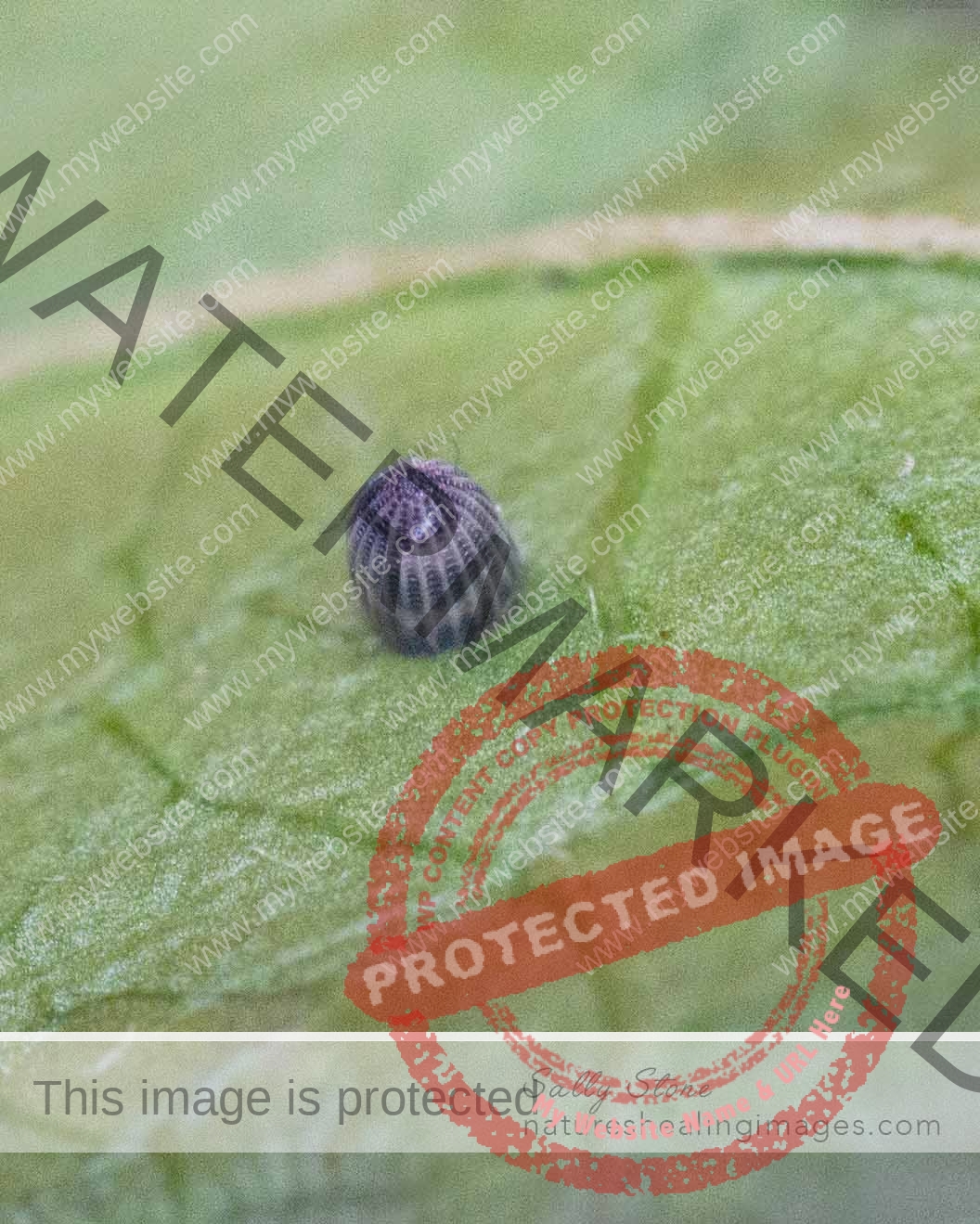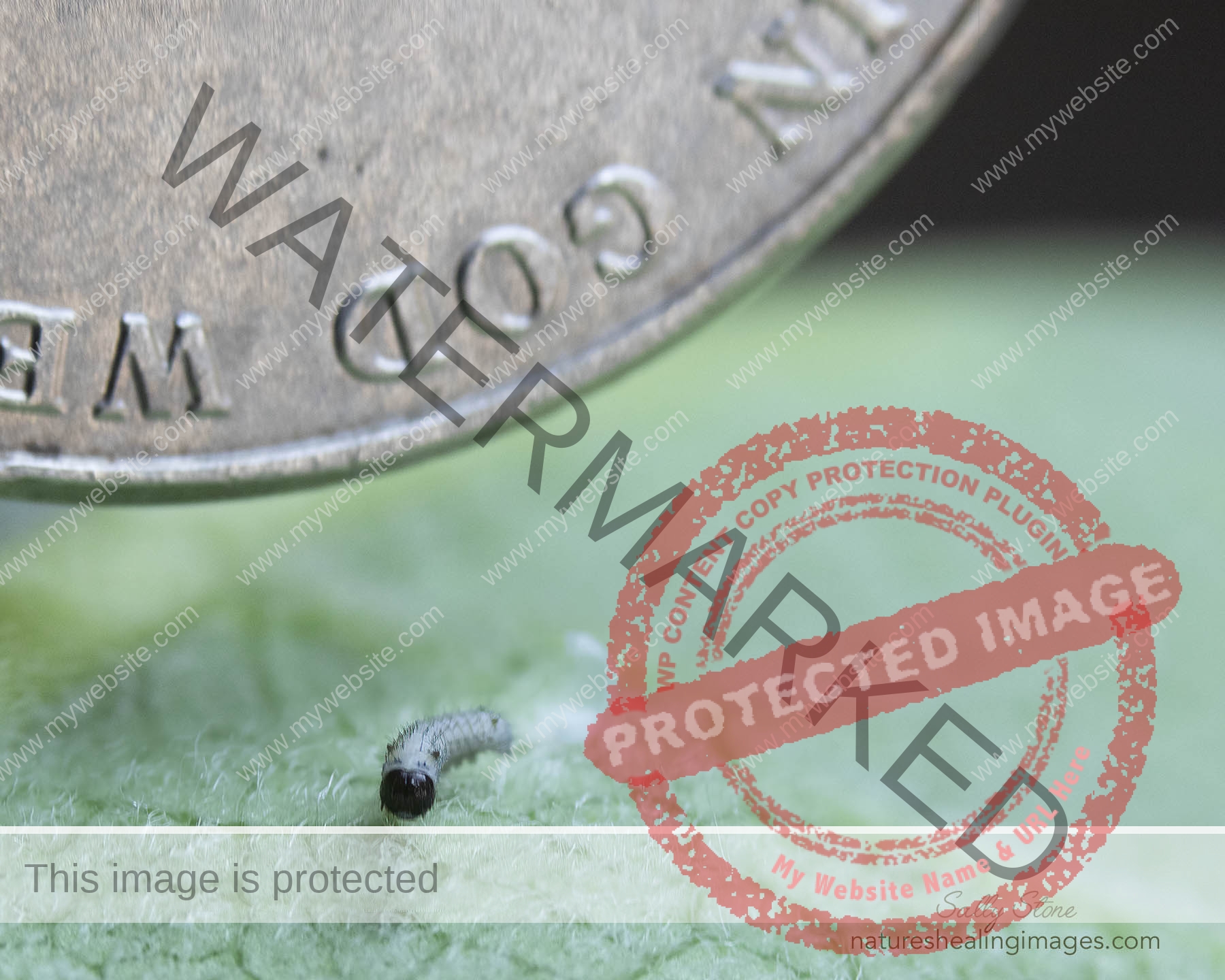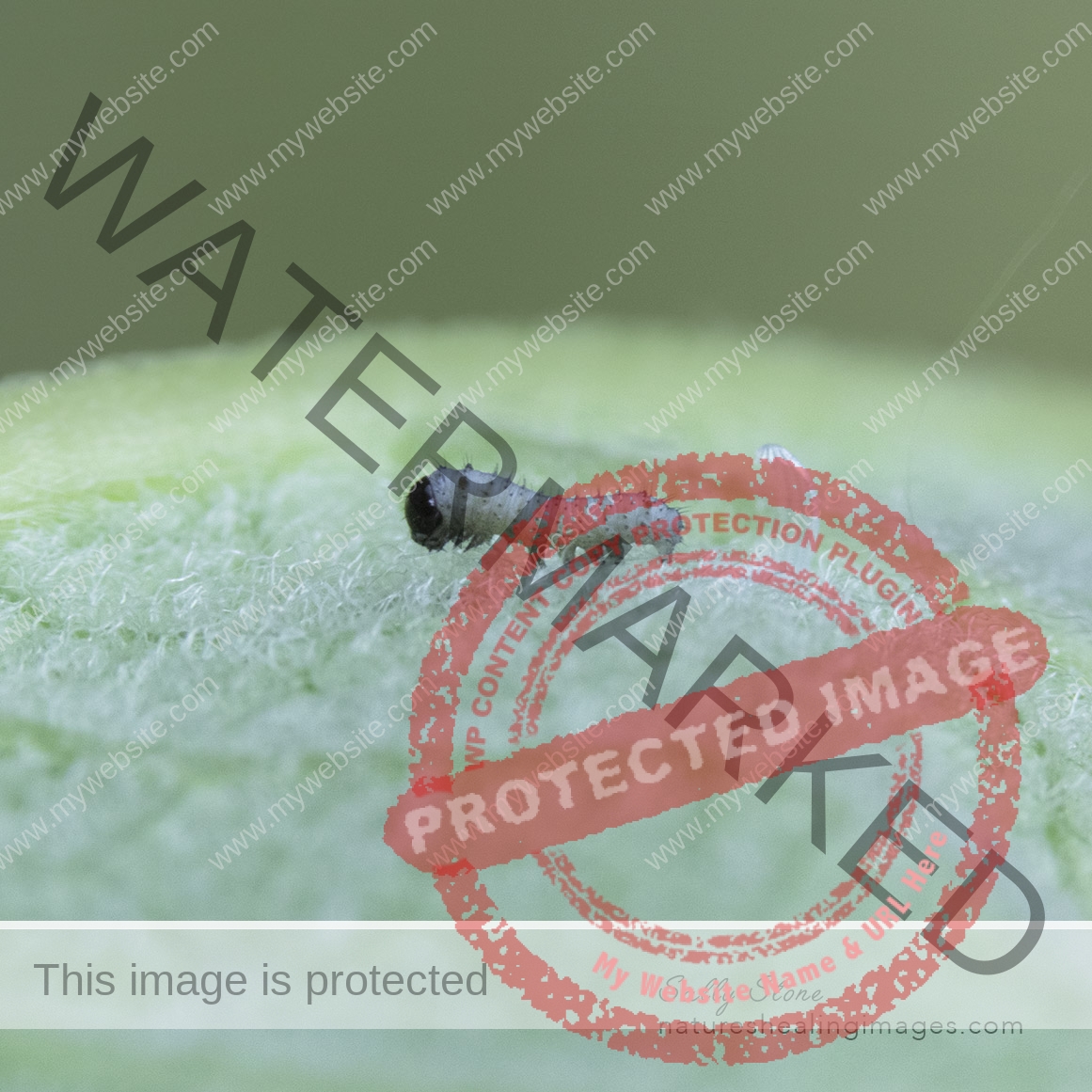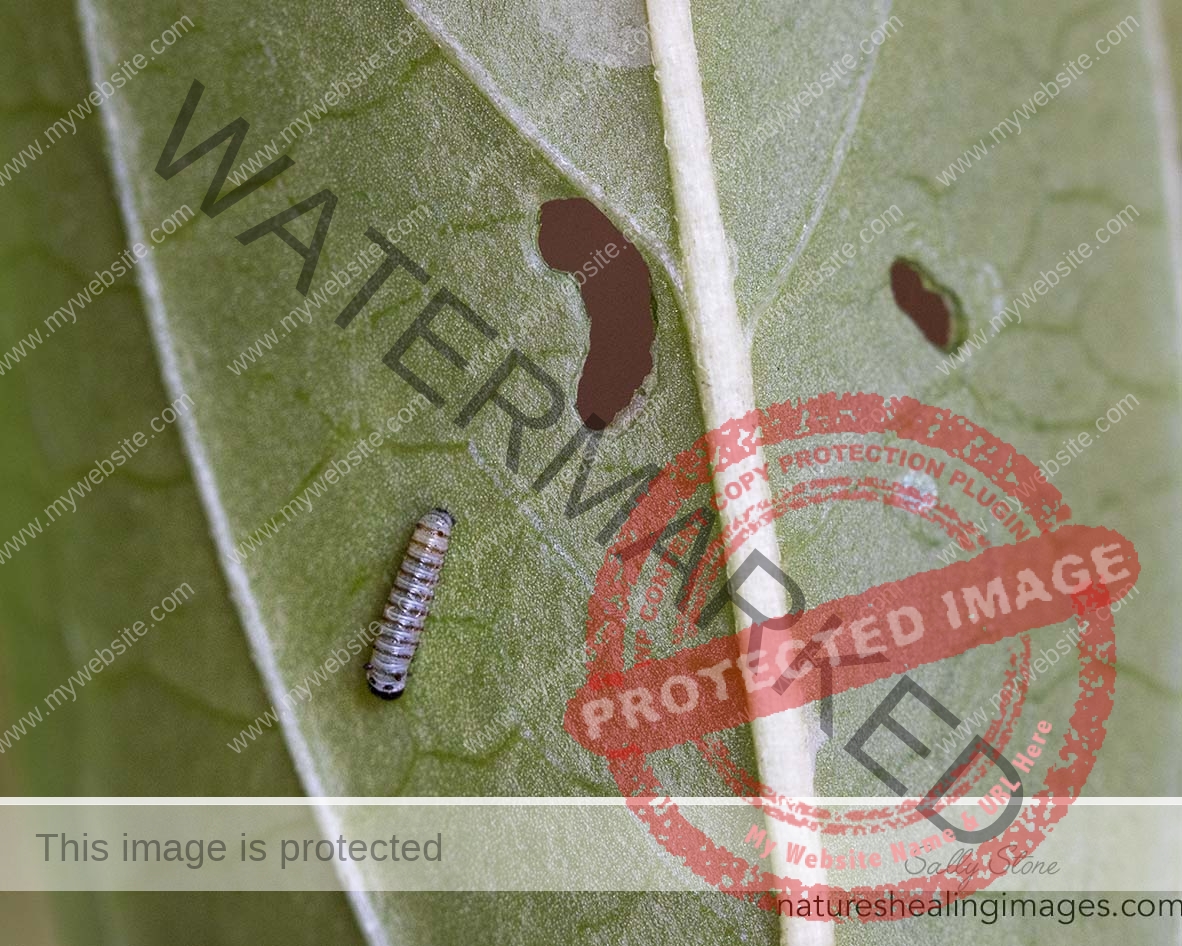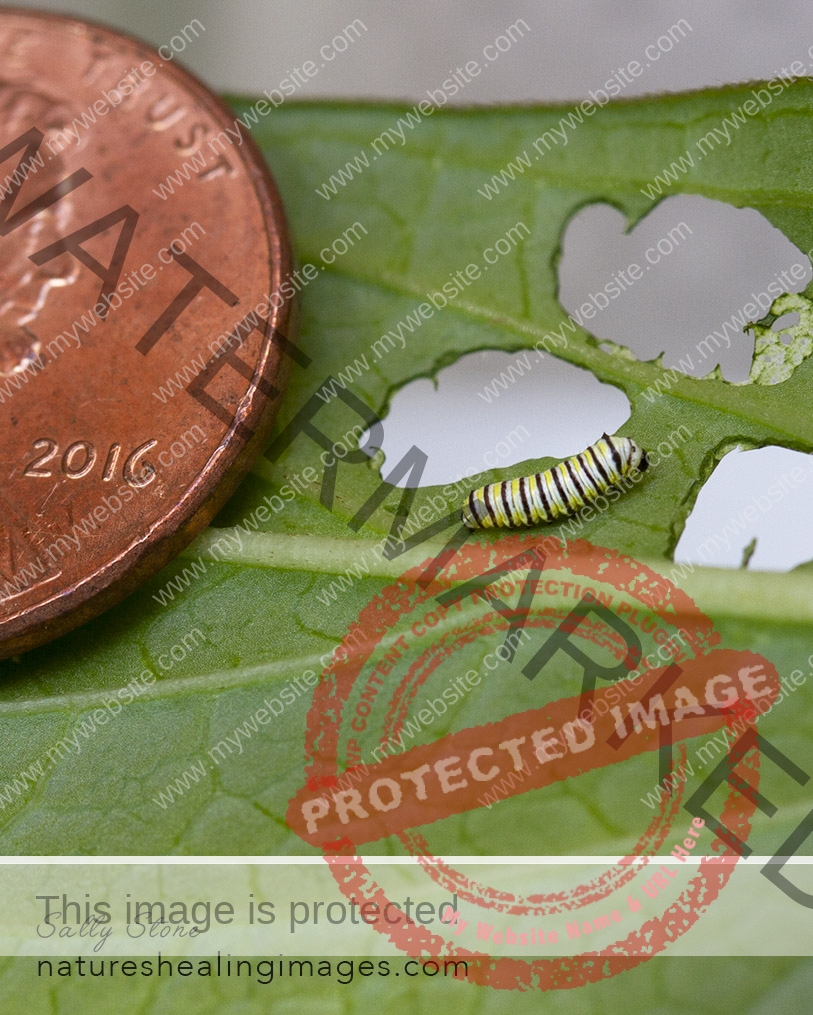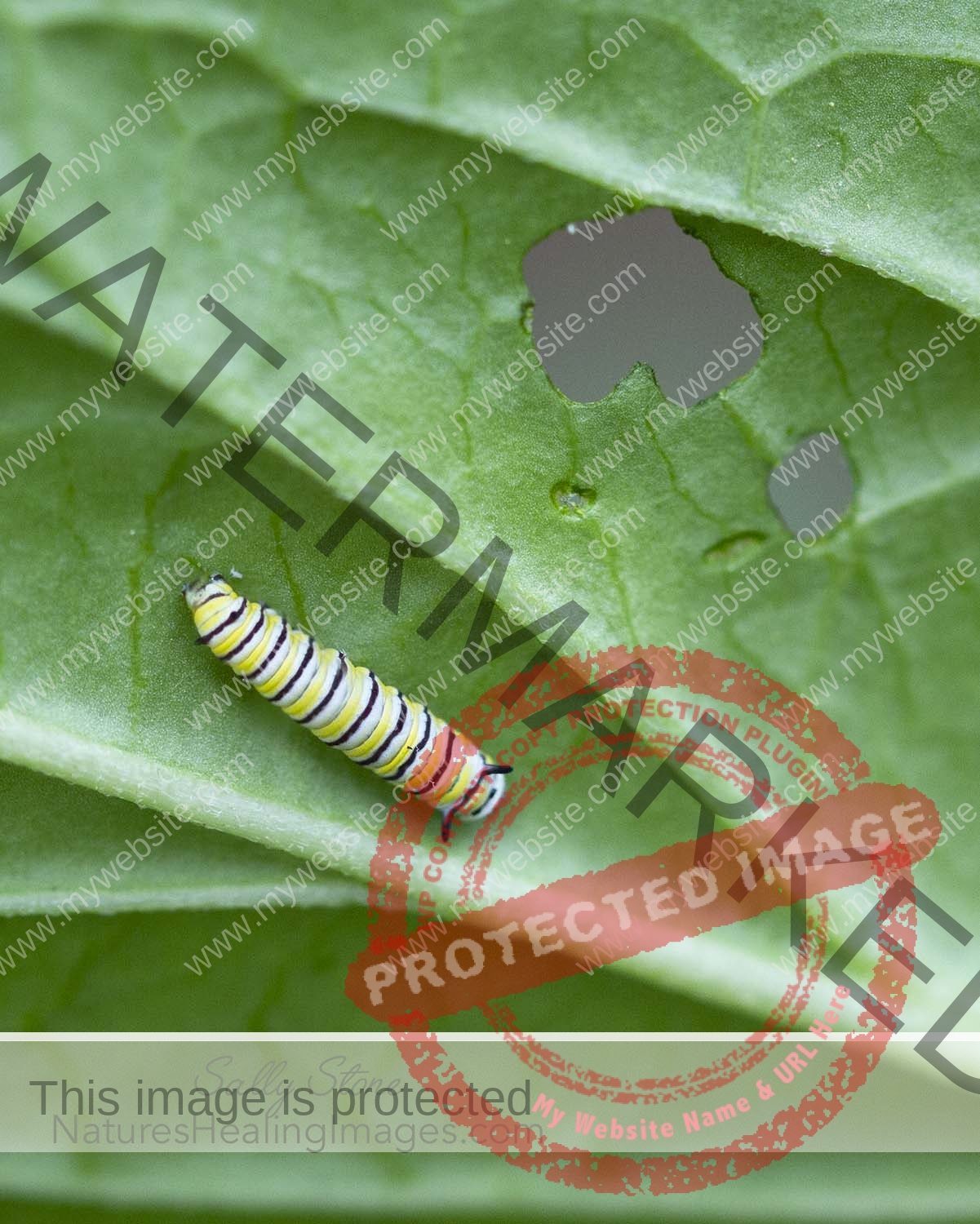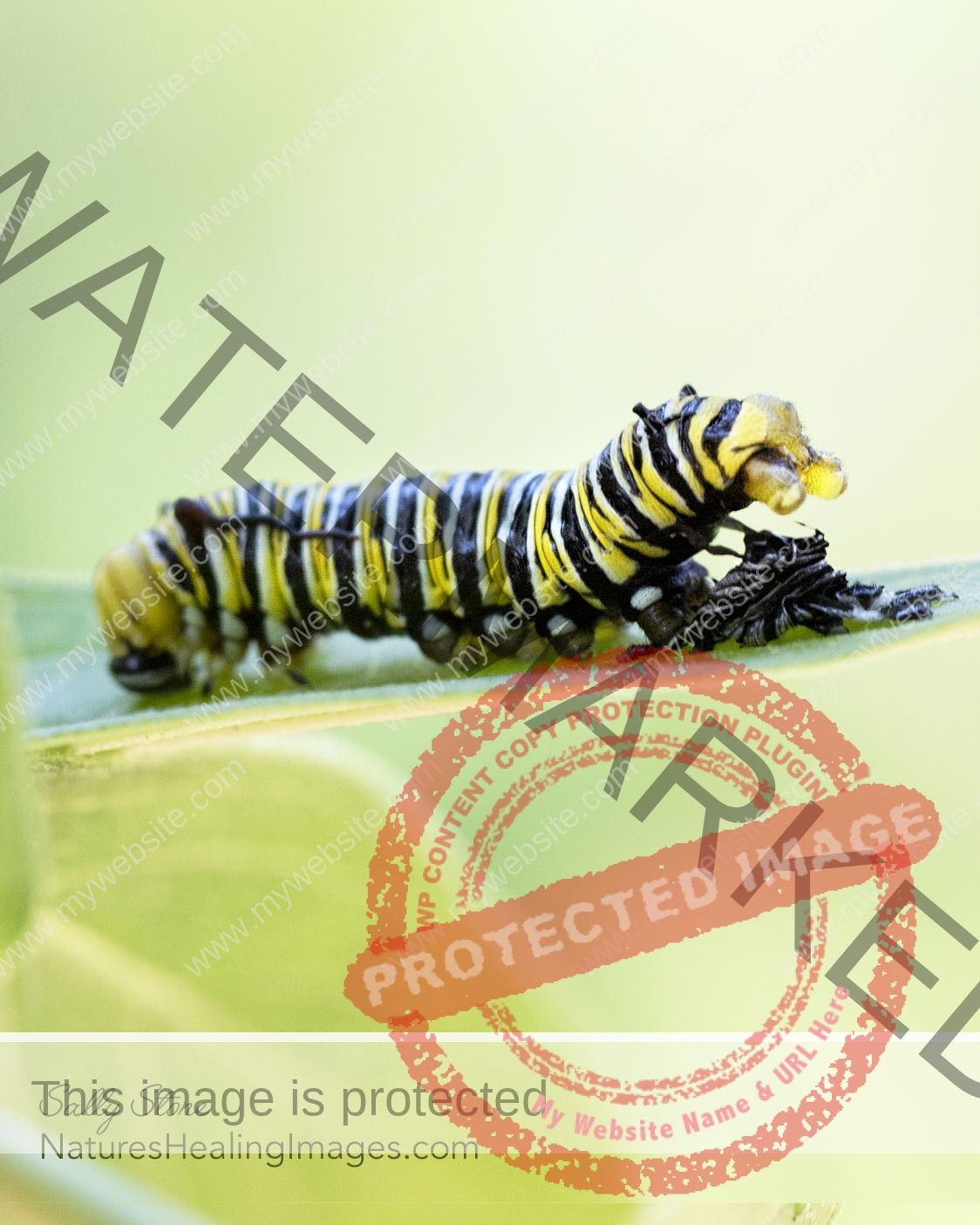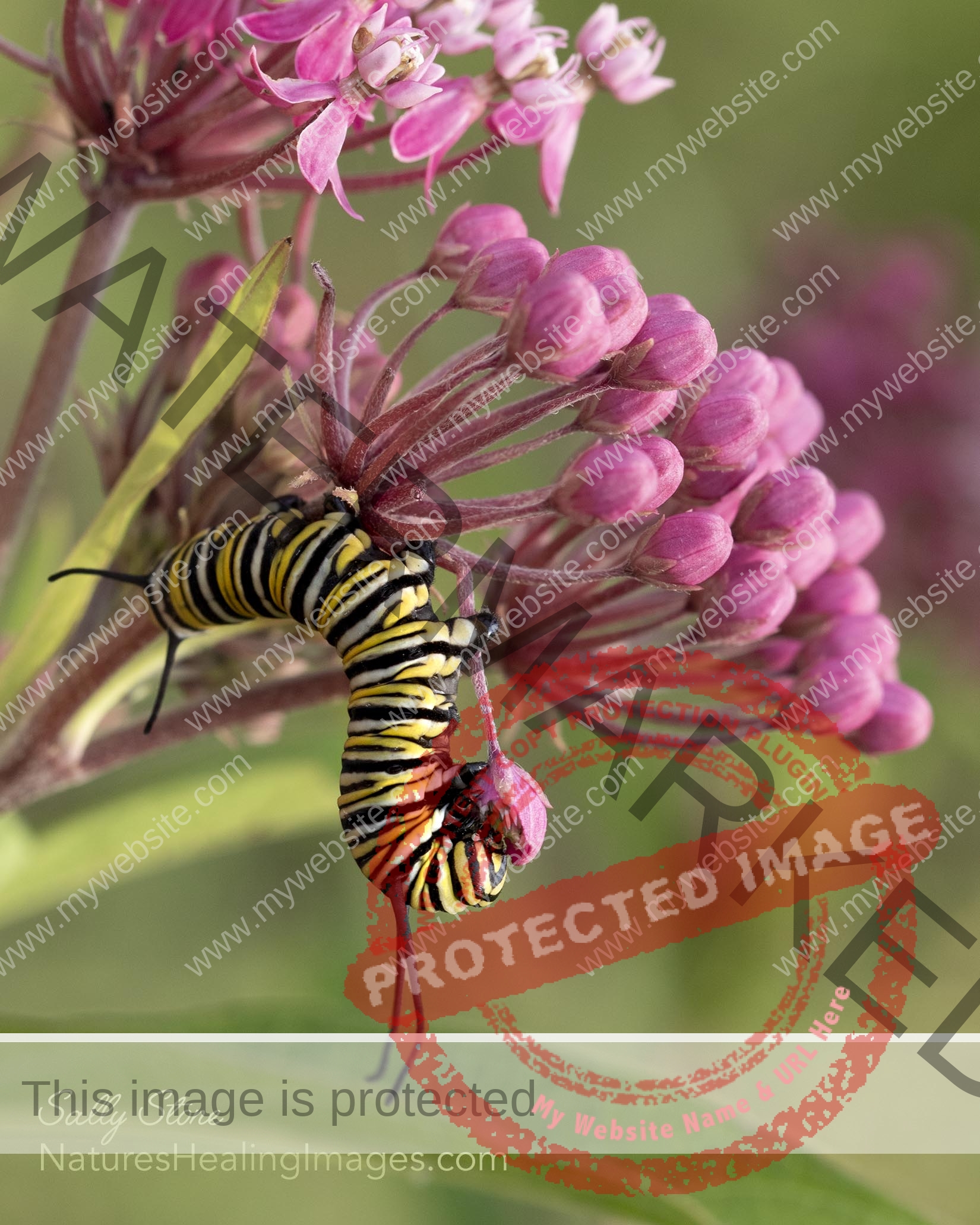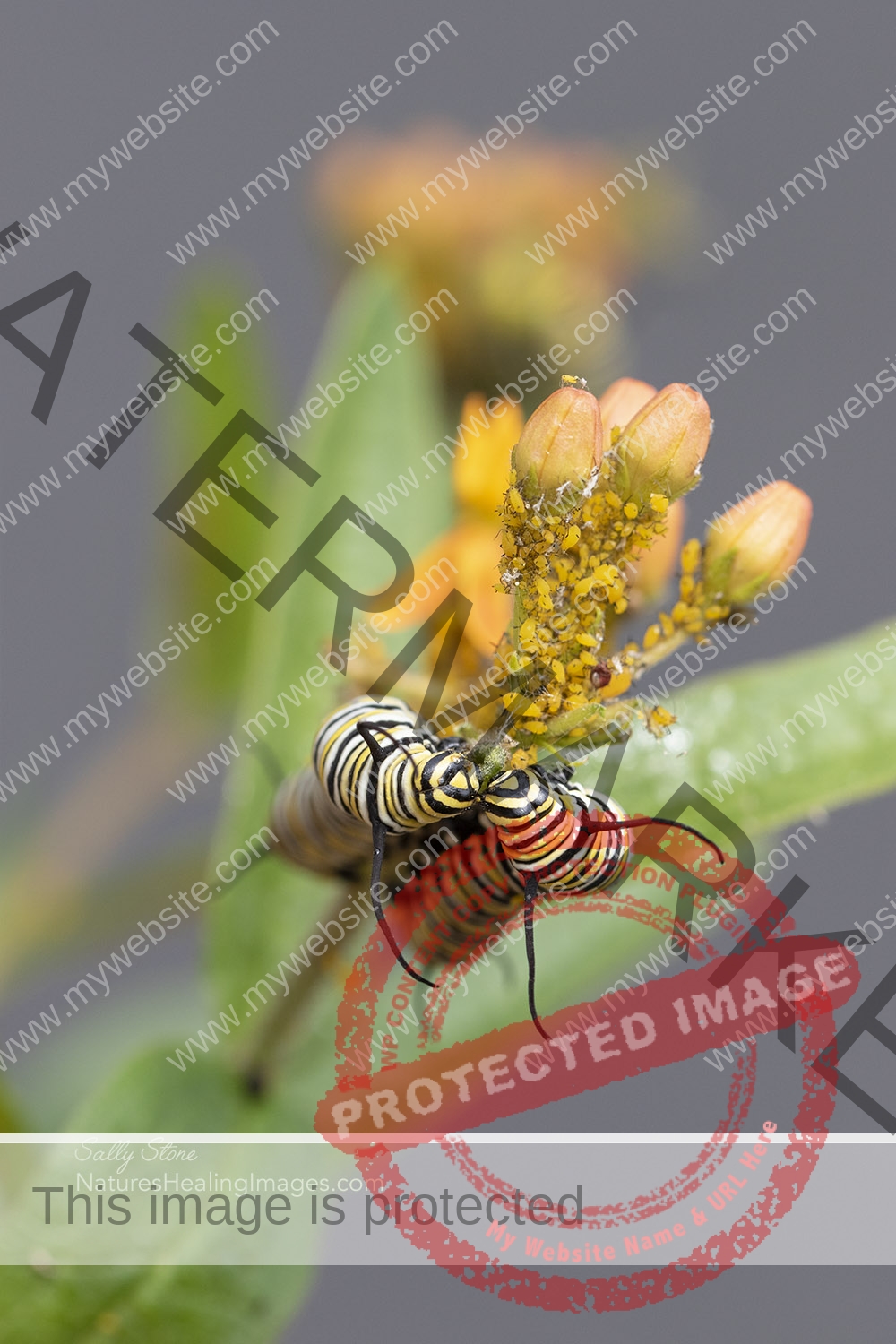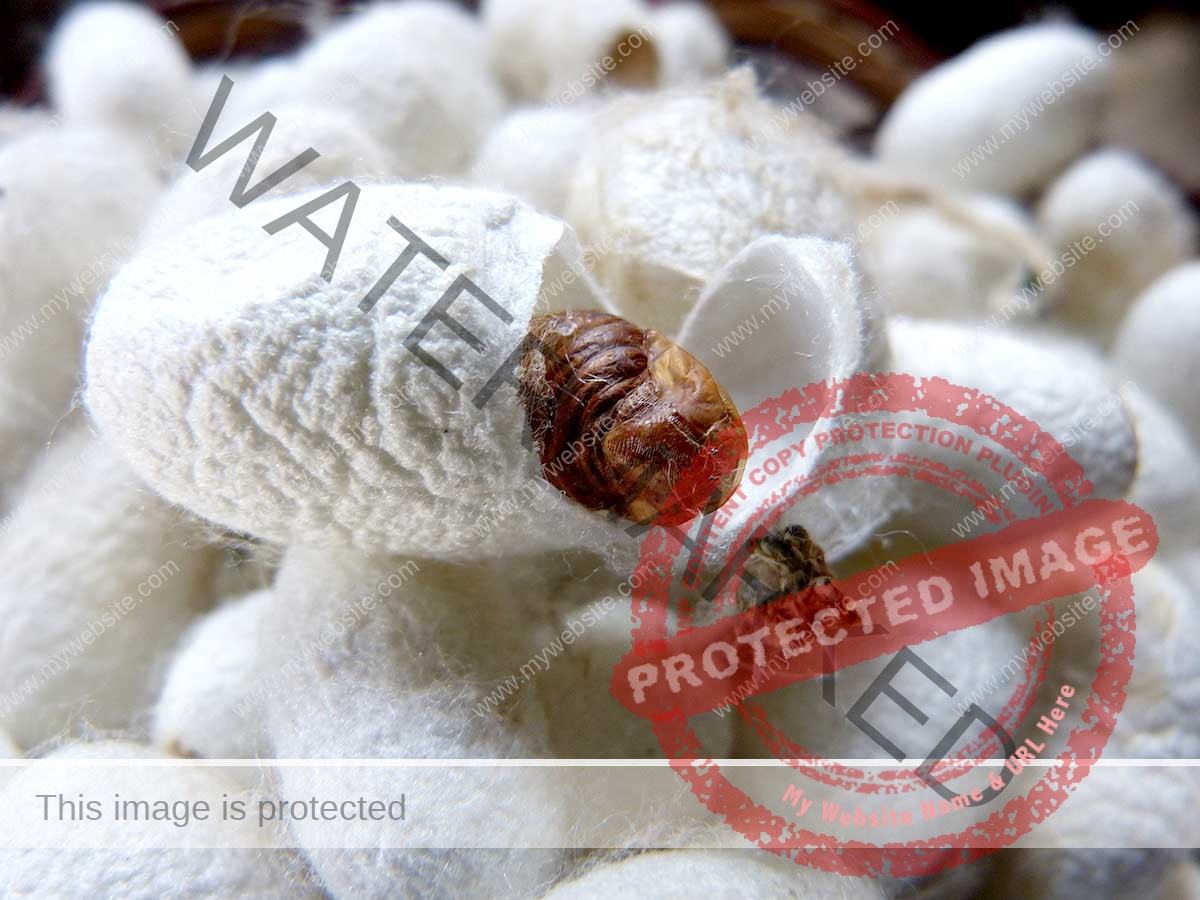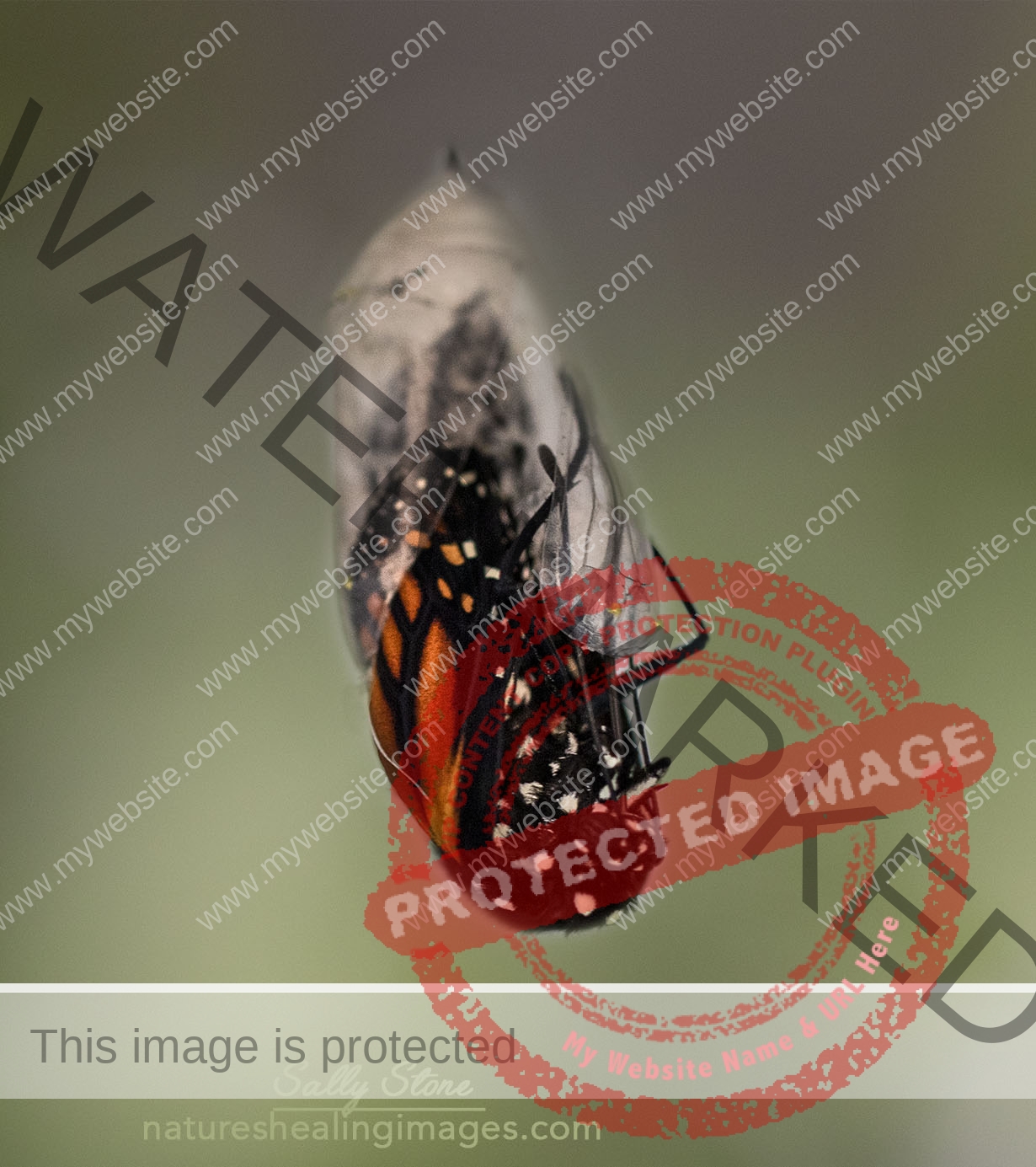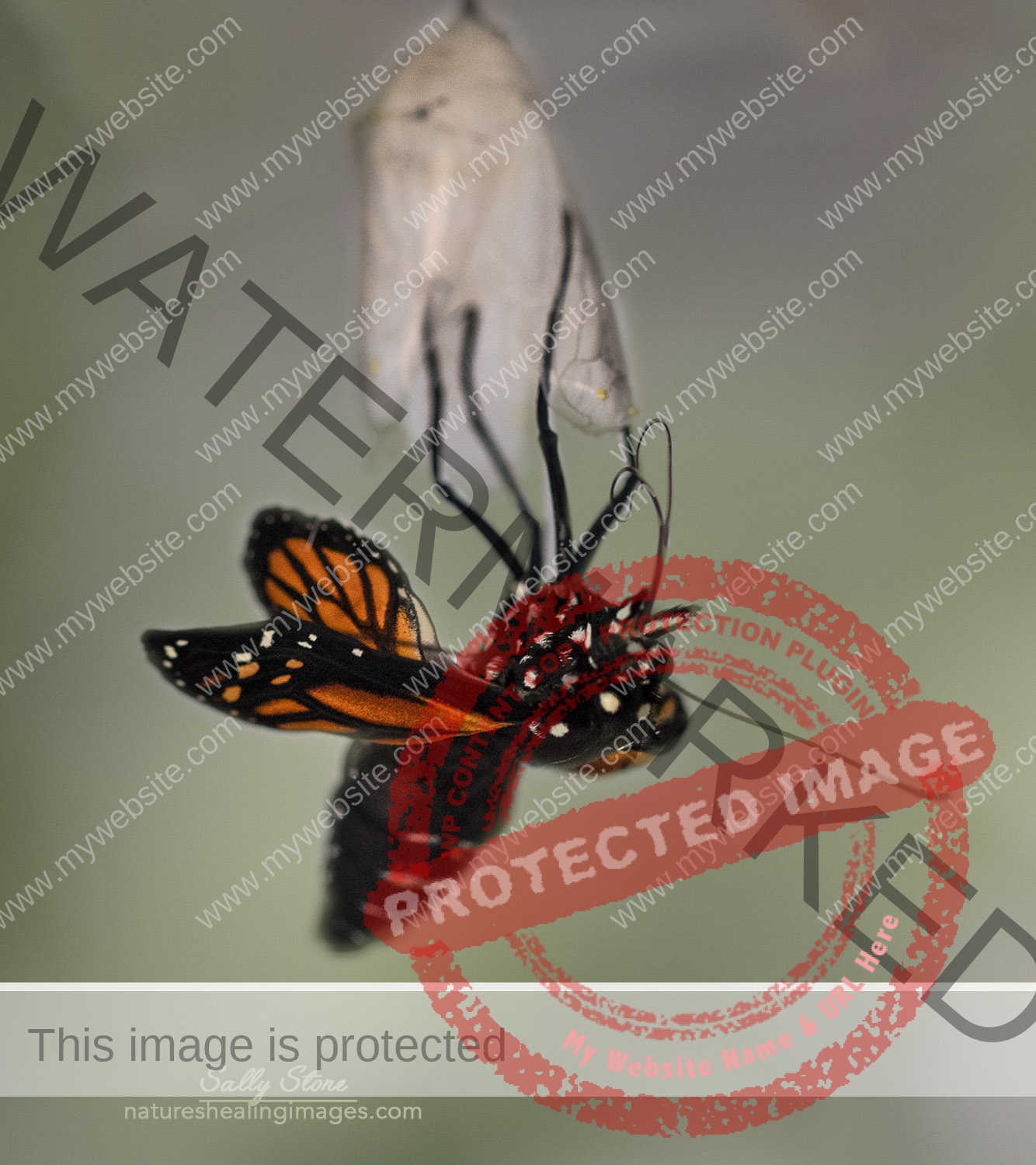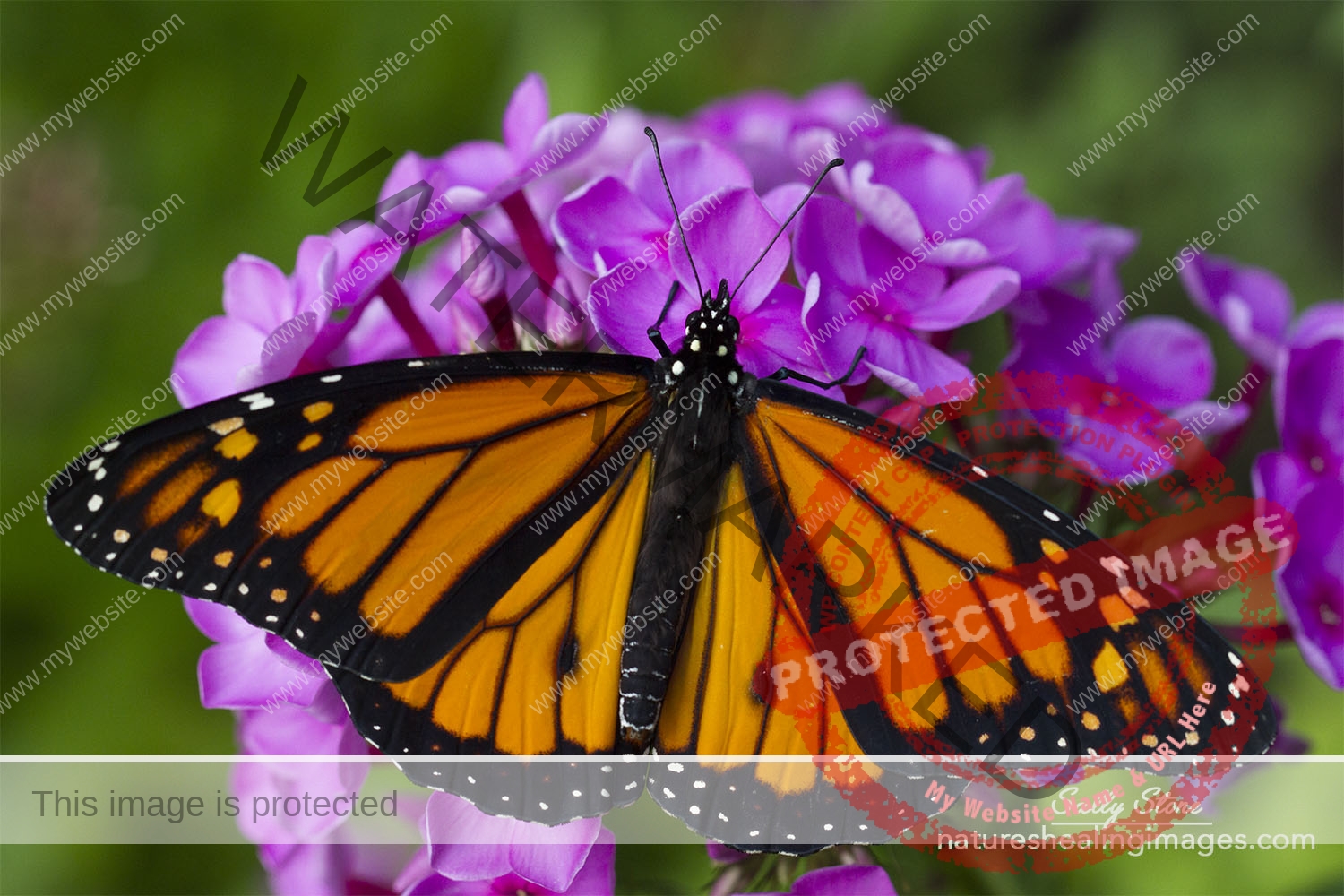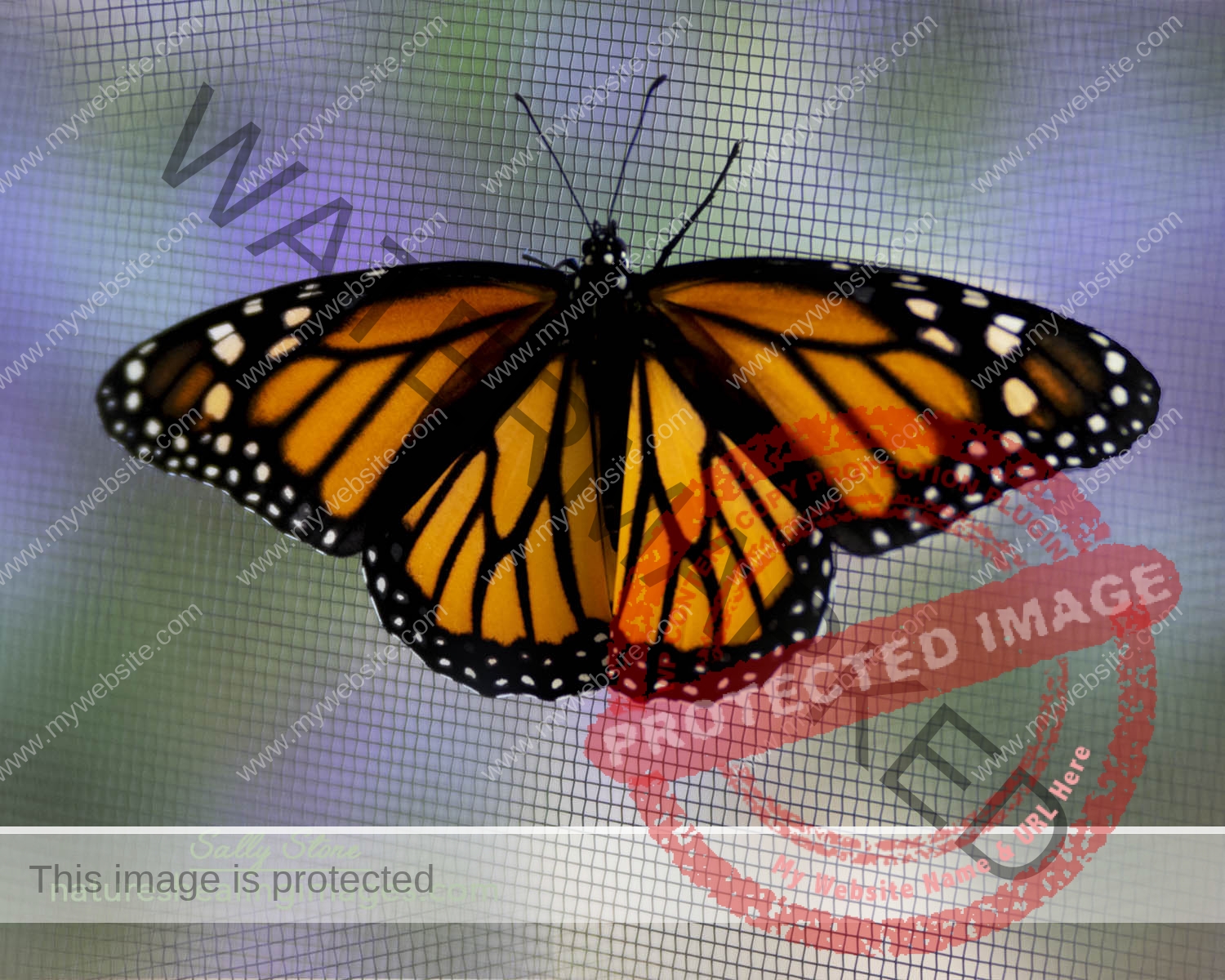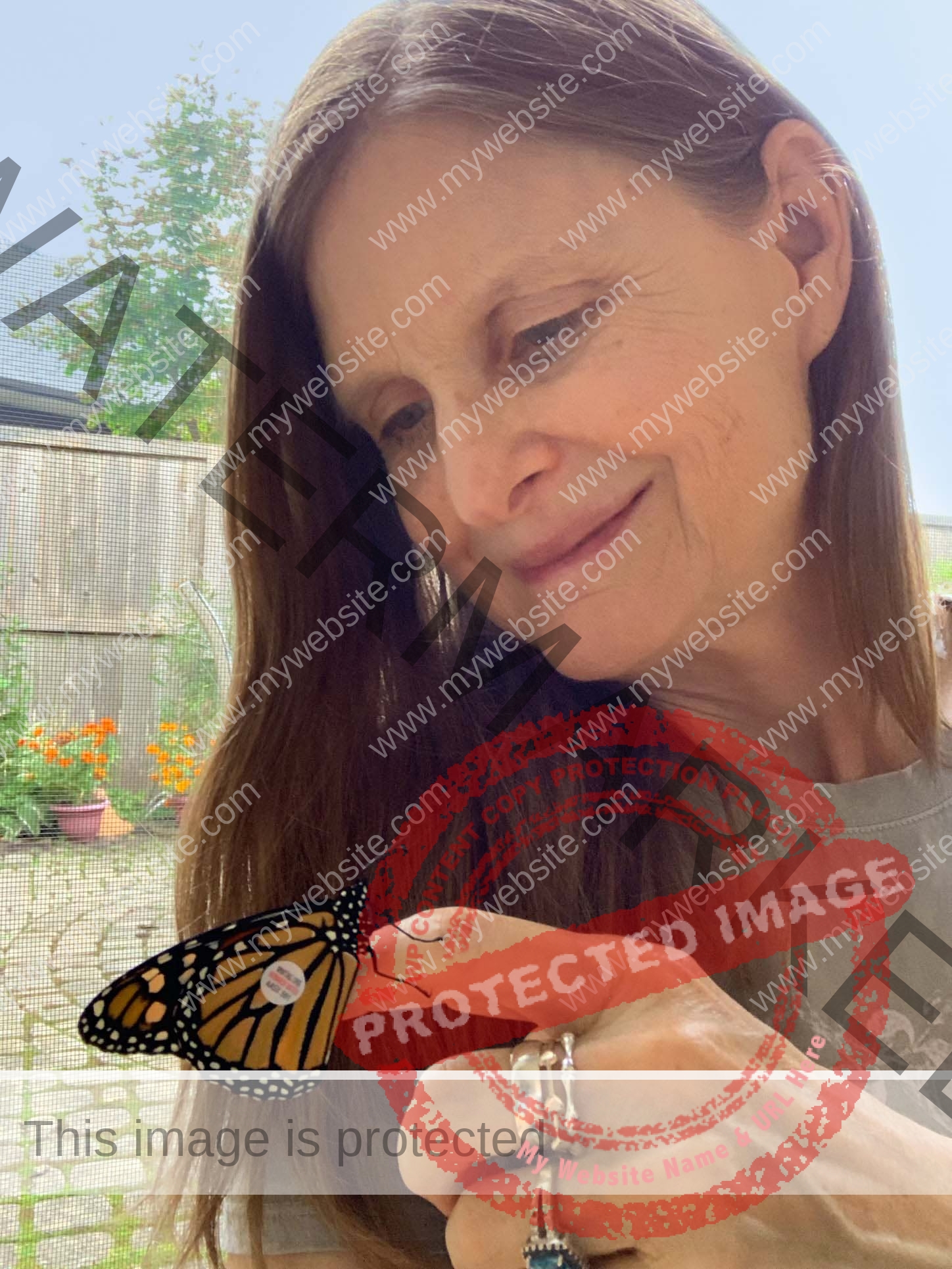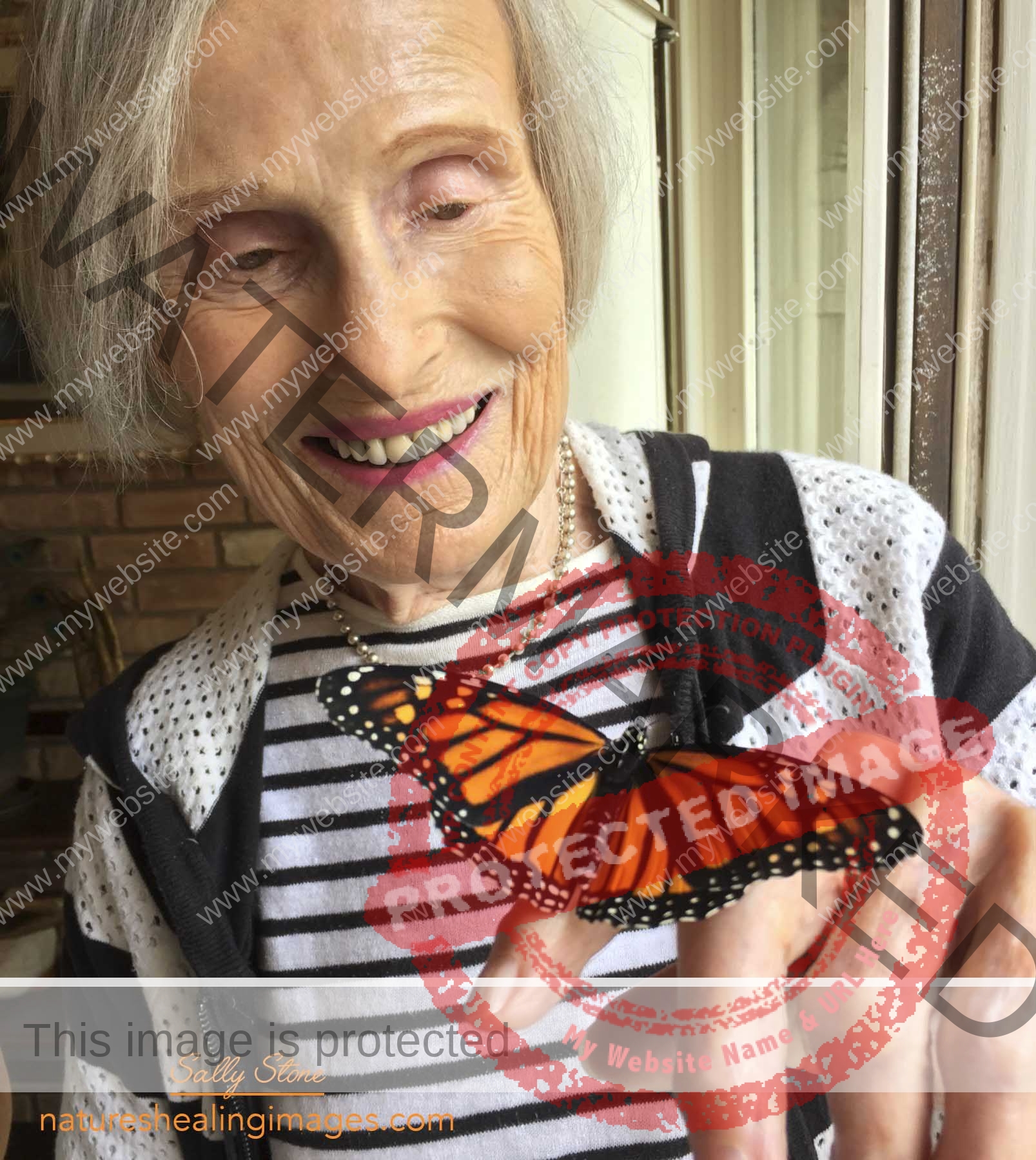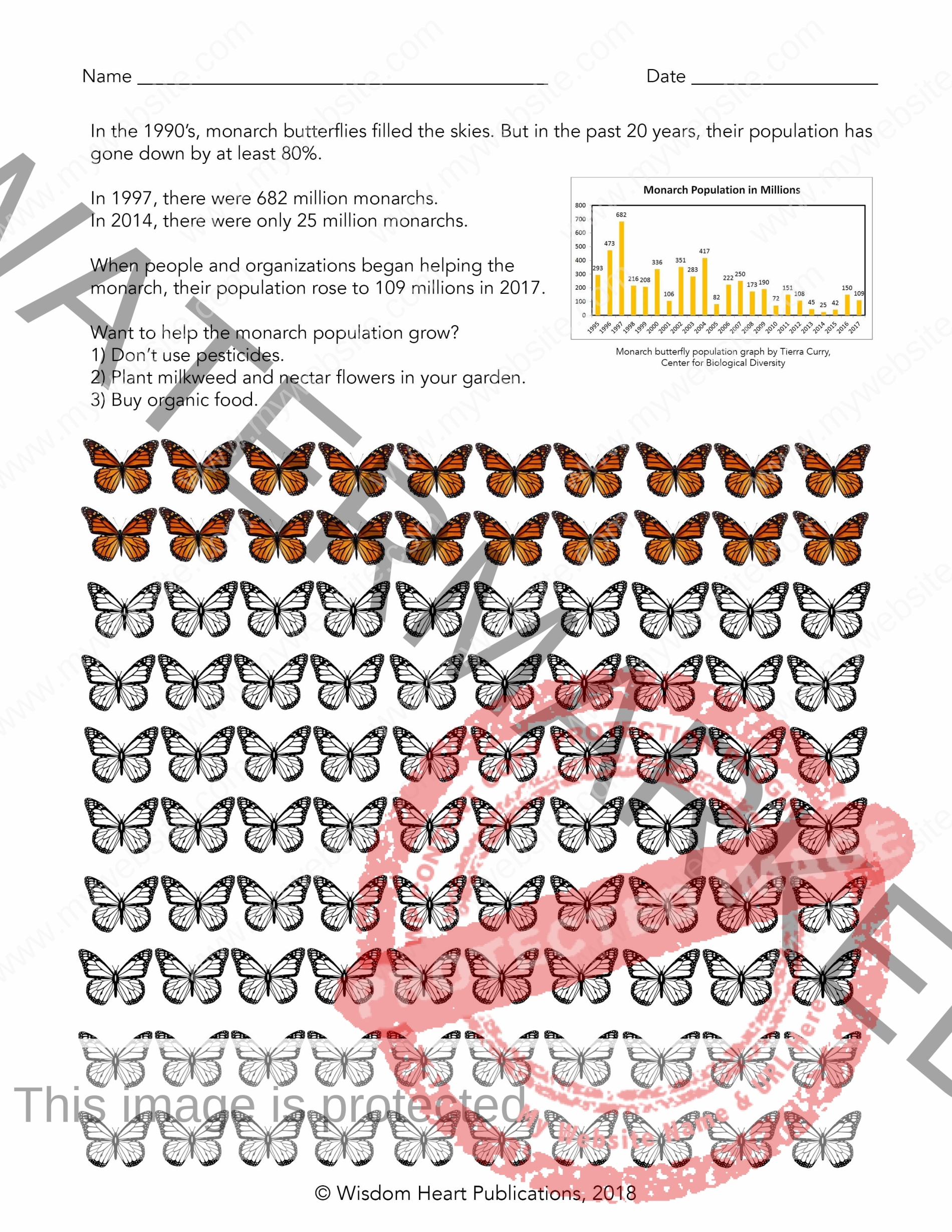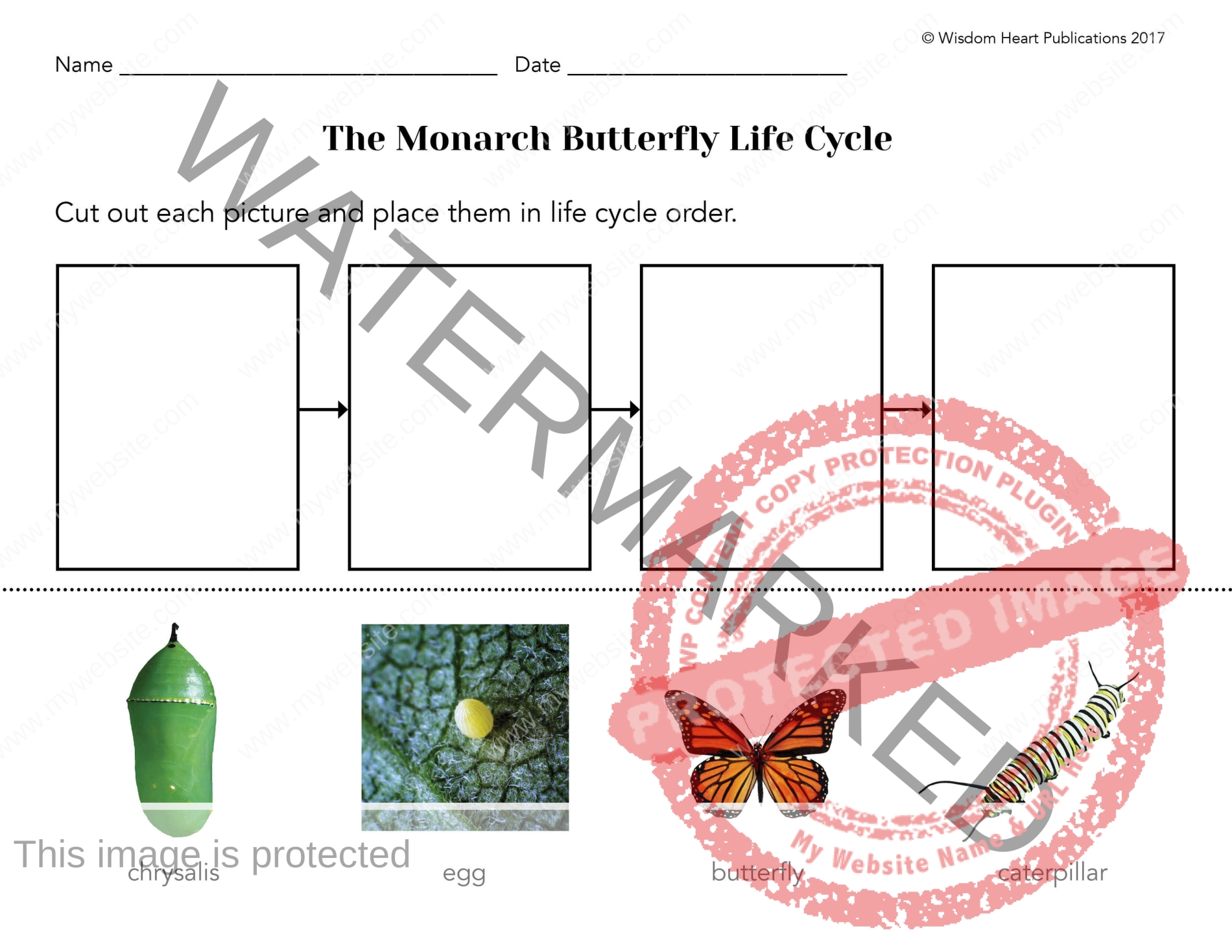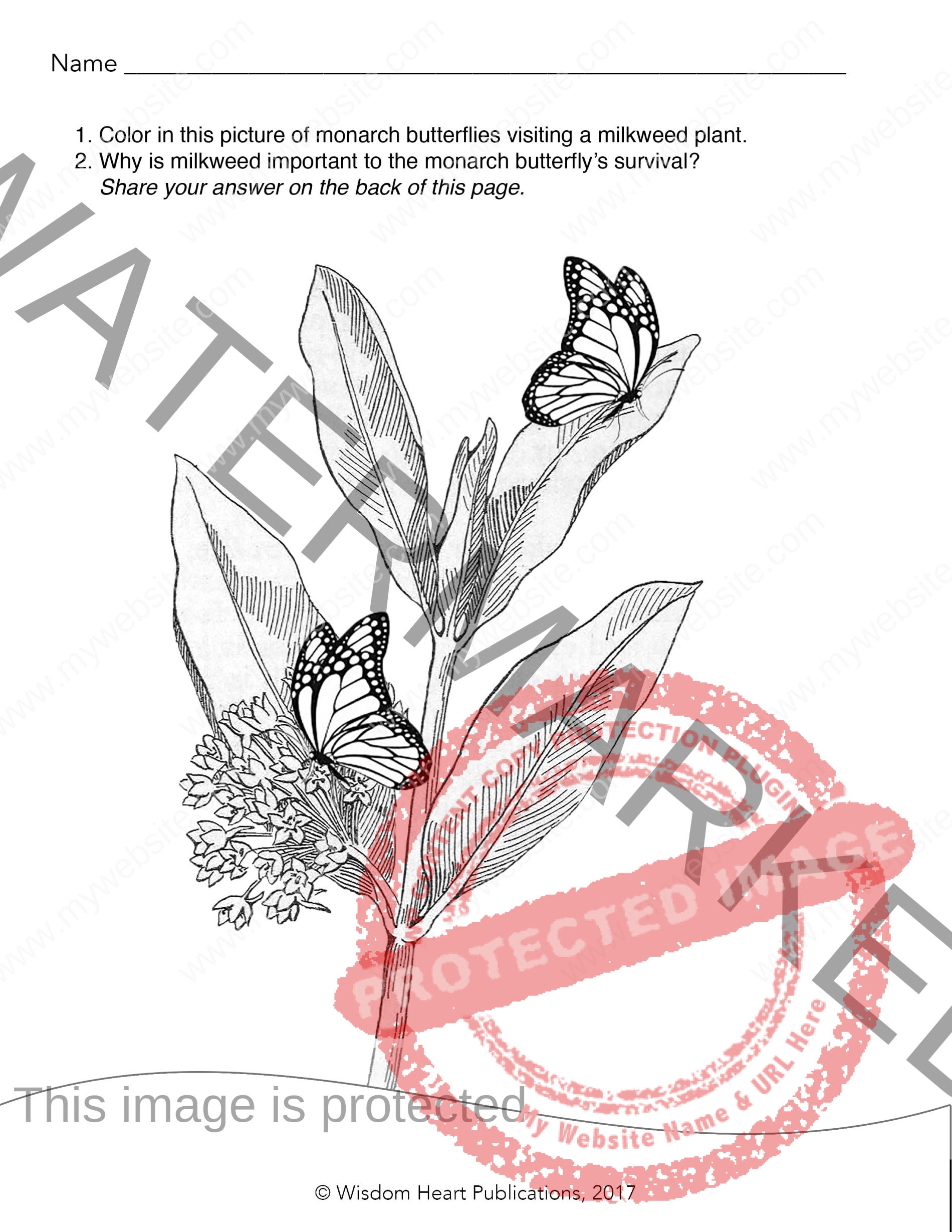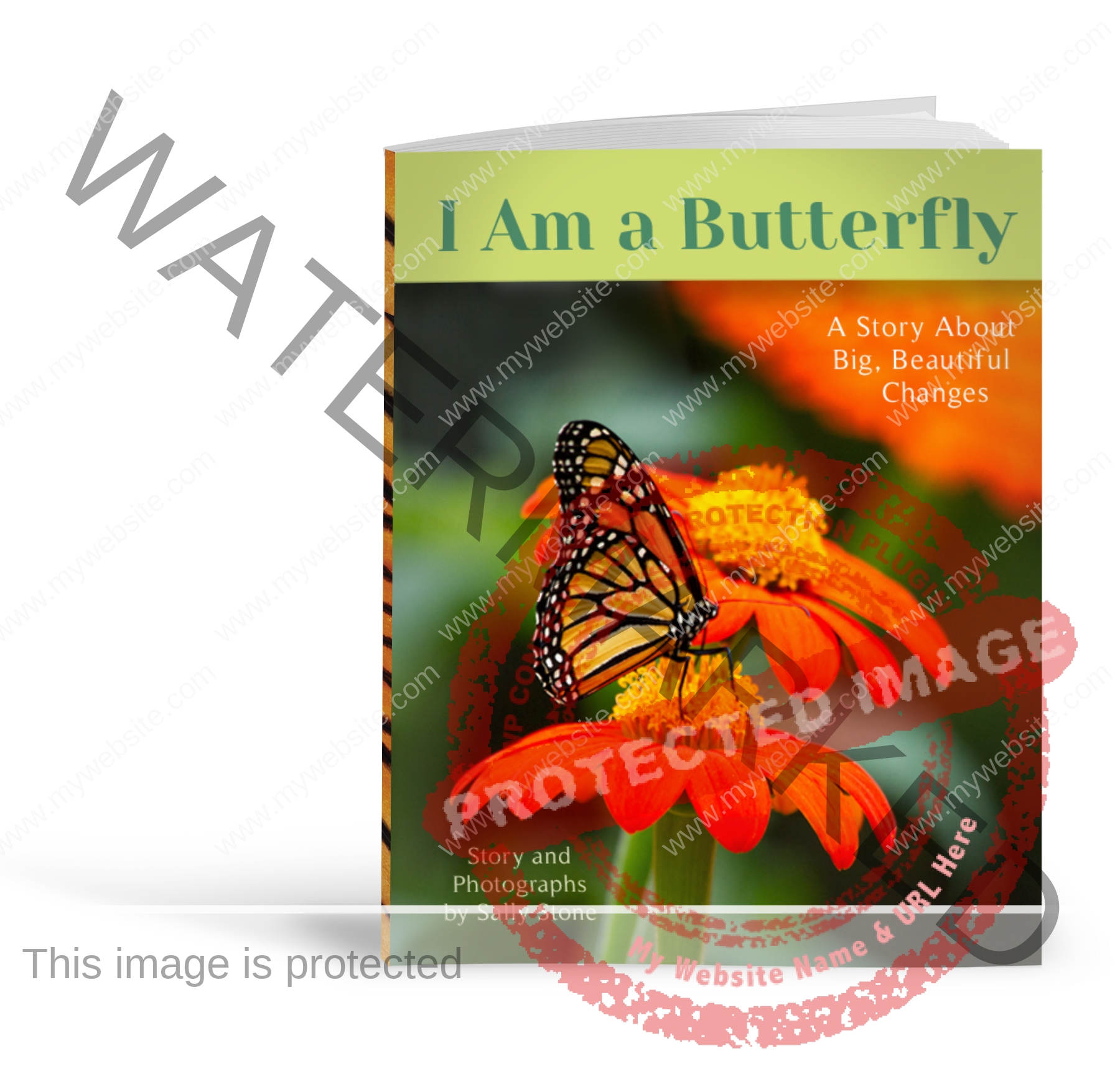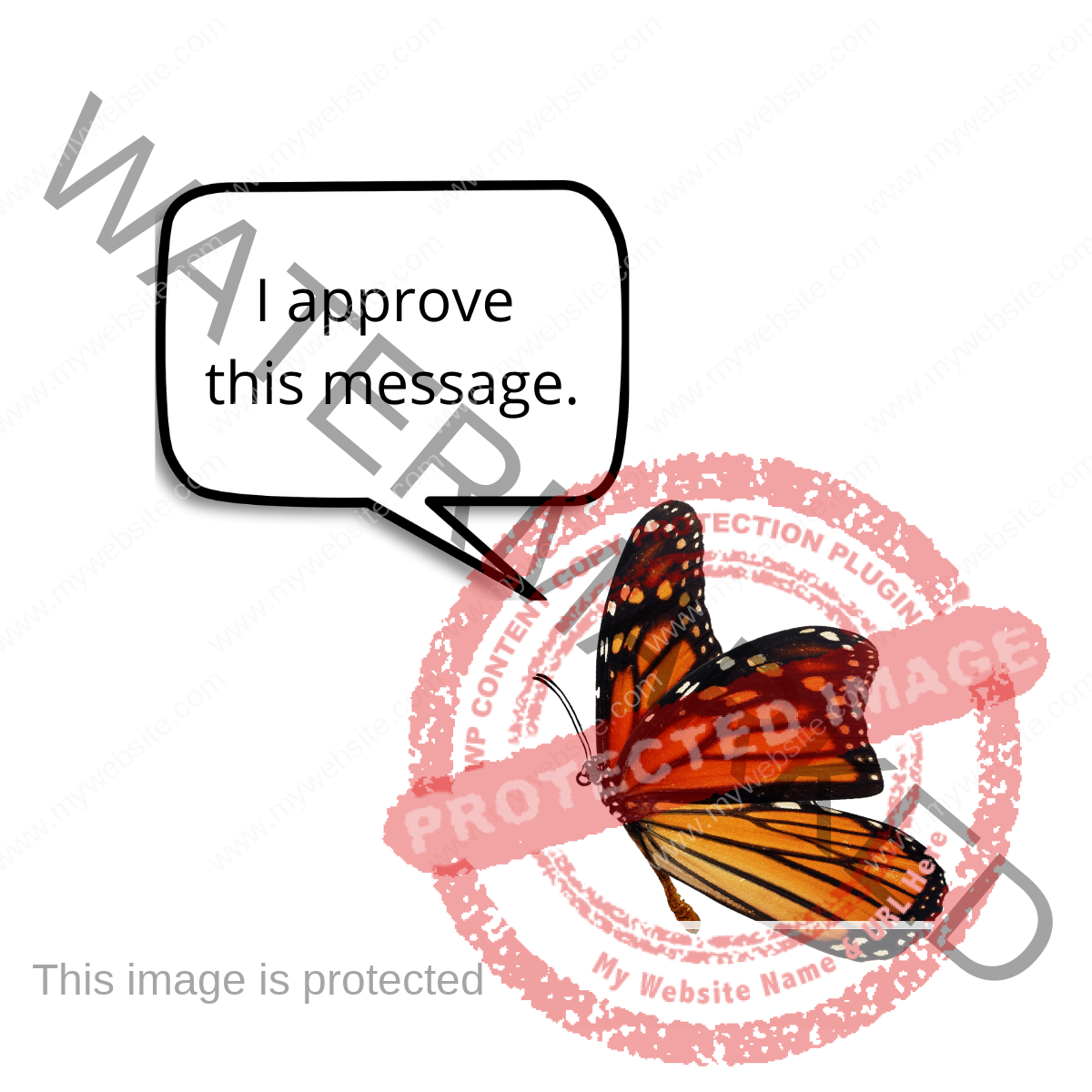Monarch Butterfly Life Cycle
The backyard passion project of a Monarch Mama
Scroll for Teaching Resources (dot 4)
The Monarch Butterfly Life Cycle
A Monarch Butterfly Lays Eggs
The monarch butterfly life cycle start with laying eggs on milkweed plants. In the beginning of the season, the butterflies glue their eggs on the underside of leaves. When the milkweed blooms, she often lays her eggs inside the flower buds, like the one pictured here is doing.
So if you’re looking for monarch eggs, check underneath leaves and inside the buds and blossoms of milkweed plants.
Monarch Butterfly Egg
Monarch eggs are as tiny as a sesame seed. This one is on the underside of a milkweed leaf with a nickel sitting next to it. Doesn’t the nickel look HUGE in comparison? So if you want to find eggs, look carefully for a tiny cream-colored bump.
When the caterpillar is about to hatch, you’ll see a black spot at the top. That’s the caterpillar’s head starting to push up and out.
But if the egg has black spots all over it, it’s full of parasites—Trichogramma wasps— who lay their eggs inside monarch eggs and feed off the growing caterpillar. If you’re raising caterpillars and see an egg like this, squish it before the wasps fly out!
If you want to see a monarch egg up close, get yourself a magnifying glass and handle with care.
The Newborn Monarch Caterpillar
A newborn monarch caterpillar is just a tiny speck on a leaf, especially compared to a penny.
When it’s first born, scientists call it the “first instar.”
“Instar” is a fancy, scientific name for a caterpillar. The number of instars refers to how many times the caterpillar molts as it outgrows its skin. A newly born monarch caterpillar is the first instar out of five instars.
After pushing out of its egg, the caterpillar eats its shell. Yum?
First Instar Caterpillar
After the caterpillar eats its own egg, it starts eating the leaves or flowers where it hatched. To the right of this first instar caterpillar, you can see the hole in the leaf, where it’s been munching.
First instar caterpillars eat mow the leaf hairs, then chew out rainbow-shaped holes in the leaves.
As the first instar grows, the skin smooths out compared to when it was a bristly newborn. However, the caterpillar doesn’t have the well-known monarch stripes just yet.
Second Instar Caterpillar
Second instar caterpillars now have the typical monarch caterpillar stripes.
Their back antennae are more developed, but still small. They have a yellow triangle on their face, which is partially shown in this photo, with two yellow bands surrounding it.
Third Instar Caterpillar
Third instar caterpillars have more clearly defined yellow stripes and the triangle on their face is larger. Like second instars, they continue to eat leaf layers and chew out holes in the leaves, but they also eat around leaf edges.
A third instar caterpillar will drop off a leaf, curl up, and play dead if they feel threatened. If you’re raising monarchs and this happens, a caterpillar could end up on the floor if you’re not careful!
Fourth Instar Caterpillar
The black, yellow, and white bands are more clearly defined on the entire fourth instar caterpillar.
On a fourth instar caterpillar, white spots on the prolegs are more obvious.
What are prolegs? Monarch caterpillars have true legs, on the thorax, which is right next to the head end of the caterpillar. They have prolegs along their abdomen, which comes after the thorax. The prolegs aren’t true legs, but stub-like with tiny hooks that help the caterpillar hang on.
Fourth instar caterpillars eat from leaf edges toward the stem of the leaf. In this photo, the caterpillar has just finished molting. Soon it will turn around and eat its shed skin! To see this in action, look for the video on this page: “Munching Molted Skin.”
Fifth Instar Caterpillar
Fifth instar caterpillars eat voraciously and become very plump. The black, yellow, and white bands are clearly defined and look soft and smooth.
The first pair of true legs are very close to the head, which is the end with the long antennae. The white spots on the stumpy-looking prolegs are clearly defined.
Hold the Sap, Please
According to Monarch Lab, “Fifth Instar caterpillars often chew a shallow notch in the petiole of the leaf they are eating, which causes the leaf to fall into a vertical position.”
The petiole is the stem of the leaf that connects to the stem of the plant. The caterpillar chews the notch out so the white milkweed sap flows more slowly into the leaf. Otherwise, the caterpillar gets a mouthful of sap in every bite. Yuck!
The Monarch Caterpillar “J”
When a monarch caterpillar is ready to change into a butterfly, it crawls away to find a safe place to change. First, the caterpillar securely attaches itself with a silk knob-like “button,” then it hangs in a “J” position. When the caterpillar is ready to shed its skin for the last time, the antennae droop down.
If you want to see this amazing process for yourself, check out the videos on this page: from monarch caterpillar to chrysalis.You’ll see the caterpillar shed its last skin and reveal a beautiful green chrysalis with gold markings.
A chrysalis is also called a “pupa.” So when the caterpillar crawls off to hang in a “j” we say it’s going off to “pupate.”
The Monarch Butterfly Chrysalis
Right after the caterpillar sheds to reveal the chrysalis, the chrysalis is soft. That’s why the chrysalis shouldn’t be handled or moved until it hardens, which takes several hours, at least.
Soup’s On!
Inside the chrysalis, the caterpillar begins to digest itself and turns into caterpillar soup. In the soup are special cells called “imaginal discs.” Each imaginal disc turns into a part of the adult butterfly: wings, legs, proboscis, etc… The rest of the soup is food for the growing butterfly.
https://www.scientificamerican.com/article/caterpillar-butterfly-metamorphosis-explainer/
The Almost Born Monarch Chrysalis
When the butterfly is ready to emerge from the chrysalis, the wings become visible through the chrysalis. At this point, the monarch could emerge at any time. But what I’ve noticed in raising monarchs is that most butterflies emerge in the morning. It’s worth getting up early and waiting to see this wonder of nature!
Note: When a monarch butterfly is born, scientists say the monarch has “eclosed.” ”Eclose” is a scientific word for “emerge,” which means “to come out of something.” In this case, the monarch is coming out of its chrysalis.
The Emerging Monarch Butterfly
Now comes the part of the monarch butterfly lifecycle we’ve all been waiting for!
Just before the butterfly emerges, the chrysalis splits open. Then the monarch drops out. The wings are wet and crumpled from being squished inside the chrysalis, so they hang from the chrysalis and pump their wings with fluid (from their thorax) until the wings are fully opened. They continue hanging for several hours until their wings harden.
Look, But Don’t Touch
If the newly emerged butterfly falls from the chrysalis and doesn’t find a place to hang and pump their wings, the wings will dry crumpled up. If this happens, the butterfly won’t be able to fly and feed itself. So be careful not to knock the butterfly off the chrysalis during this process.
However, if you’re raising monarchs and one does fall off the chrysalis, put out your finger for the butterfly to crawl on and guide him or her back to the chrysalis—or to another safe place to hang.
The Empty Monarch Chrysalis
When the monarch butterfly is ready to fly away, they leave the chrysalis behind. If you see one, there’s a monarch somewhere!
The Monarch Butterfly
When a monarch butterfly is born, he or she doesn’t need to eat for 24 hours. Not having to eat lets them hide until their wings are hard and they’re used to being a butterfly.
I usually leave them alone unless they become active. Then I offer them fruit or a sponge soaked in 9 parts water to 1 part honey. Some begin feeding, but others aren’t interested.
If they’re born in the morning, become active by late afternoon, and the weather is warm, I release them in the afternoon. If they’re resting or it’s raining out, I keep them overnight.
Then, on the second day, I offer them more fruit and place them on nectar flowers in my garden so they can feed before leaving. However, if it’s still raining, I keep them indoors. I continue feeding them until the rain stops, then I release them.
When I put the newborn monarchs on milkweed flowers, their proboscis shoots out to get the nectar. Look closely to see this butterfly’s proboscis dipping into one of the tiny milkweed flowers to drink the sweet nectar.
The Monarch Super Generation
Where I live, in northern Illinois, spring and summer monarchs live about two to six weeks; whereas, the super generation lives about 8 months.
During that 8-month period, the super generation migrates up to 3,000 miles from Canada, and throughout the US, to the Sierra Madre Mountains in Mexico. In Mexico, monarchs roost by the thousands in oyamel fir trees to keep each other warm. They fly back in the spring and lays eggs in the southern states. Those hatchlings fly farther north, like to my backyard in Illinois, and lay eggs. And so on for 4 generations, which is the super generation. However, according to monarch scientists, some late third-generation monarchs will migrate. 🧡
Tagging Monarchs
I purchase tags from Monarch Watch. After tagging this one, I brought him outside to release. It was so windy he clung to my finger. I placed him on a flower, and he hung there with no intention of taking off! When I put my finger out to see if he wanted to go back inside, he crawled back on. He seemed to know what was happening and was content to go back in the net enclosure for another night’s sleep.
It’s normal for a monarch to stay close to home the day it’s born. According to Chip Taylor, Ph.D., top monarch scientist, monarchs don’t need to eat for a full day so they hide to gain their strength. This one gained his strength and flew off the next day to see the world!
A blend of science and whimsy, this photographically illustrated book teaches the main stages of the monarch butterfly lifecycle from the butterfly’s point of view. You may overcome your fear of the dark. And learn that you are a butterfly, too.
An engaging book for children with vivid photographs
and a simple, graceful narrative.” Kirkus Reviews
Resources on the Monarch Butterfly Lifecycle:
The Monarch Butterfly Lifecycle, Instar details:
MonarchWatch.org
How Does a Caterpillar Turn into a Butterfly
https://www.scientificamerican.com/article/caterpillar-butterfly-metamorphosis-explainer/
Five monarch butterflies drink nectar from boneset flowers.
Can you find the monarch butterfly with a tag?
*Photo taken at Techny Prairie Parks & Fields
Photo Equipment:
Camera: Canon 7D Markii
Canon EF Telephoto Zoom 100-400mm f/4.5-5.6L IS II USM
Canon EF 100mm f/2.8 Macro USM
Lensbaby Velvet 85
Kenko Extension Tubes
Manfrotto 190CX Pro3 carbon fiber Tripod
Unless otherwise labeled, photos were taken in my backyard native garden.
Scroll for videos…
Monarch Eggs About to Hatch:
The caterpillars’ black heads are at the top of the egg.
If Trichogramma Wasps parasitize a monarch egg, you’ll see black spots in the entire egg.
Older First Instar Caterpillar
Second Instar Caterpillar
Second Instar Caterpillar
A blend of science and whimsy, this photographically illustrated book teaches the main stages of the monarch butterfly lifecycle. You may overcome your fear of the dark. And learn that you are a butterfly, too.
An engaging book for children with vivid photographs and a simple, graceful narrative.” Kirkus Reviews
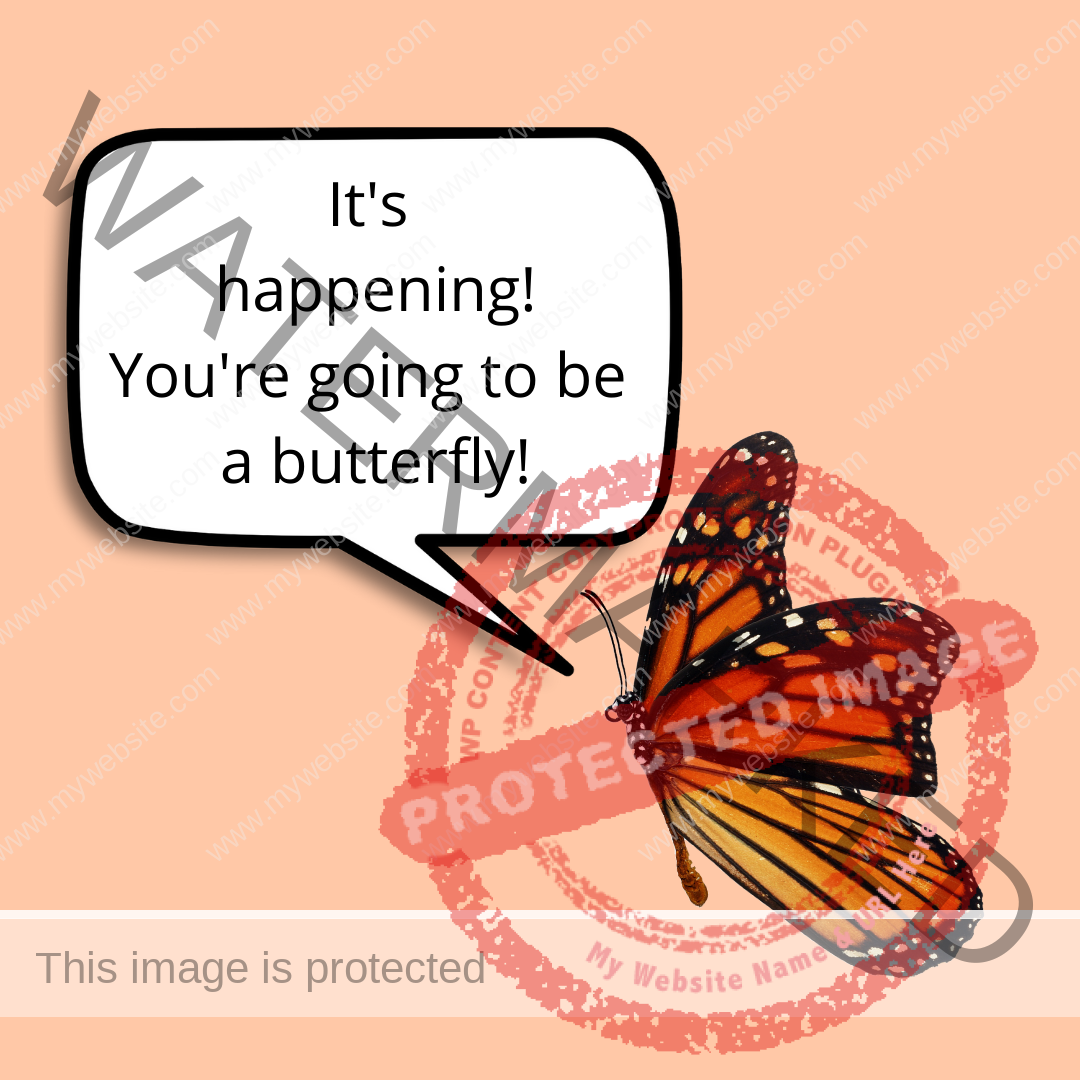
Fourth Instar Caterpillar
Fifth Instar Caterpillar on Purple Milkweed
Photo taken at Glenbrook North Prairie
Video:
Monarch caterpillar eating their shed skin
In the video above, you can watch a monarch caterpillar eat the skin it just shed. I suppose it’s nourishing, and also leaves no clues of their whereabouts for predators. Pretty clever and leaves no waste.
Video:
From monarch caterpillar to chrysalis
This time-lapse video—of a monarch caterpillar shedding its last skin—compresses a 40-minute process into an 18-second video.
Chrysalis or Cocoon?
Some people think all caterpillars spin a cocoon. Alas, they don’t.
Moths spin a cocoon around themselves, often from silk. Then the moth changes from a caterpillar into a moth inside the cocoon. The hard casing protects the caterpillar while it changes into a moth.
Butterflies, on the other hand, molt their final caterpillar skin— underneath it is their chrysalis. The chrysalis hardens and protects the caterpillar as it changes into a butterfly.
What do cocoons and chrysalises have in common? Both protect the caterpillar as it changes from a crawling caterpillar to a winged wonder!
Silk Worm Cocoons
Video:
Monarch caterpillar drinking water droplets
After cleaning and feeding the monarch caterpillars I raise indoors, I gently mist them with fresh water. They love crawling around to vacuum up the water droplets.
Video:
A Monarch butterfly is born!
This time-lapse video shows a monarch butterfly emerging from its chrysalis. The video compresses several hours into 24 seconds.
Video:
Watch Five Monarch butterflies being born!
While raising monarchs indoors, many butterflies are born at the same time. In fact, I think they like being born together.
In this 42-second time-lapse video, you can see five monarchs being born, which took about 45 minutes in real-time.
Monarch Gender: Boy or Girl?
Male Monarch
You can tell the difference between male and female monarch butterflies mainly from the black spots on the male’s hind wings. The hind wings are the smaller set of wings at the bottom. The male also has thinner black webbing—black lines—within the wings.
Female Monarch
Tagged Monarch
The week before I left for a trip to Texas, I tagged and released my last monarch of the summer. Before letting her go, we hung out together by the screen door to the patio.
Being part of a monarch butterfly’s lifecycle connects us to the magical thrill of nature. Letting them go is a moment of surrendering something I love dearly to its destiny, which is to be free. If they stay for a while or circle around before flying away, I feel a spiritual connection that makes raising them even more amazing.
I sat with this monarch for a while before taking her outside. She flew off on strong wings so I hope she made it all the way to Mexico. It would be a real kick if I saw her in Texas on her way there! In the meantime, I know others will see her and feel a special connection and message of hope themselves. 🦋
Why Tag?
You can tag raised and/or wild monarchs using tags from Monarch Watch. Why tag? According to Monarch Watch scientists, “The Monarch Watch Tagging Program is a large-scale citizen science project that was initiated in 1992 to help understand the dynamics of the monarch’s spectacular fall migration through mark and recapture.” That means everyone can participate in understanding more about one of our most beloved butterflies.
Get more info on tagging from Monarch Watch:
https://monarchwatch.org/tagging/
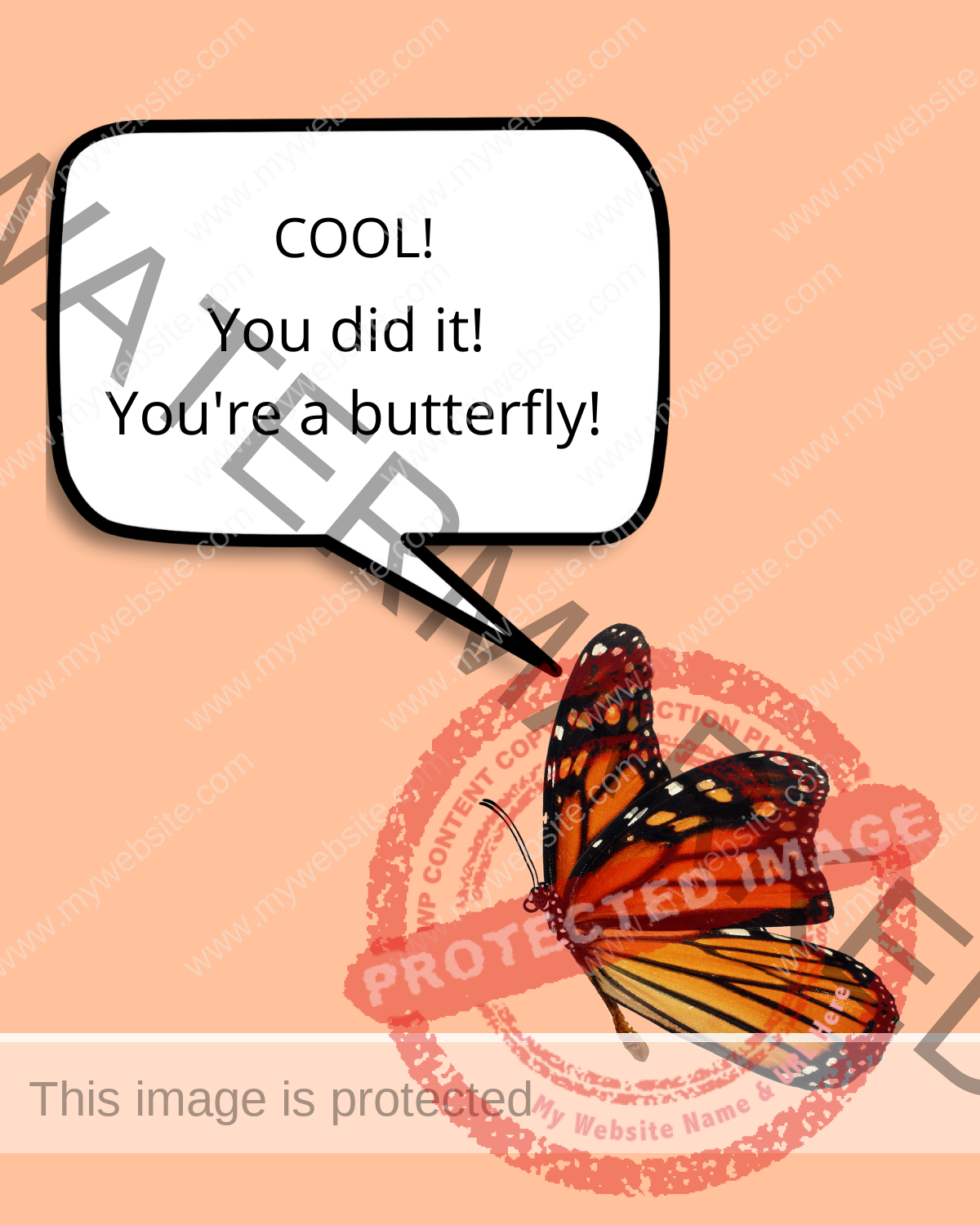
https://natureshealingimages.com/i-am-a-butterfly-book/
More butterfly photos on my website: https://natureshealingimages.com/butterflies
Email for info on school visits:
hello@natureshealingimages.com
My mom loves to connect with newborn monarchs!
Get Free Downloads
Enjoy these downloads for yourself, with your kids or grandkids, at home, or in your classroomFree Monarch Butterfly Downloads
Monarch Endangerment Graphic
8 x 10 Monarch Butterfly Print
Monarch Butterfly Lifecycle Worksheet
Monarch Mandala
Monarchs on Milkweed Coloring page
***
P.S. I rarely email my list. When I do, emails may include monarch butterfly resources, publication updates, opportunities to read and review upcoming books, art market events, or blog posts.
Privacy: I do not list share.
Download: Monarch Mandala Coloring Page
This mandala was created from a section of a monarch wing!
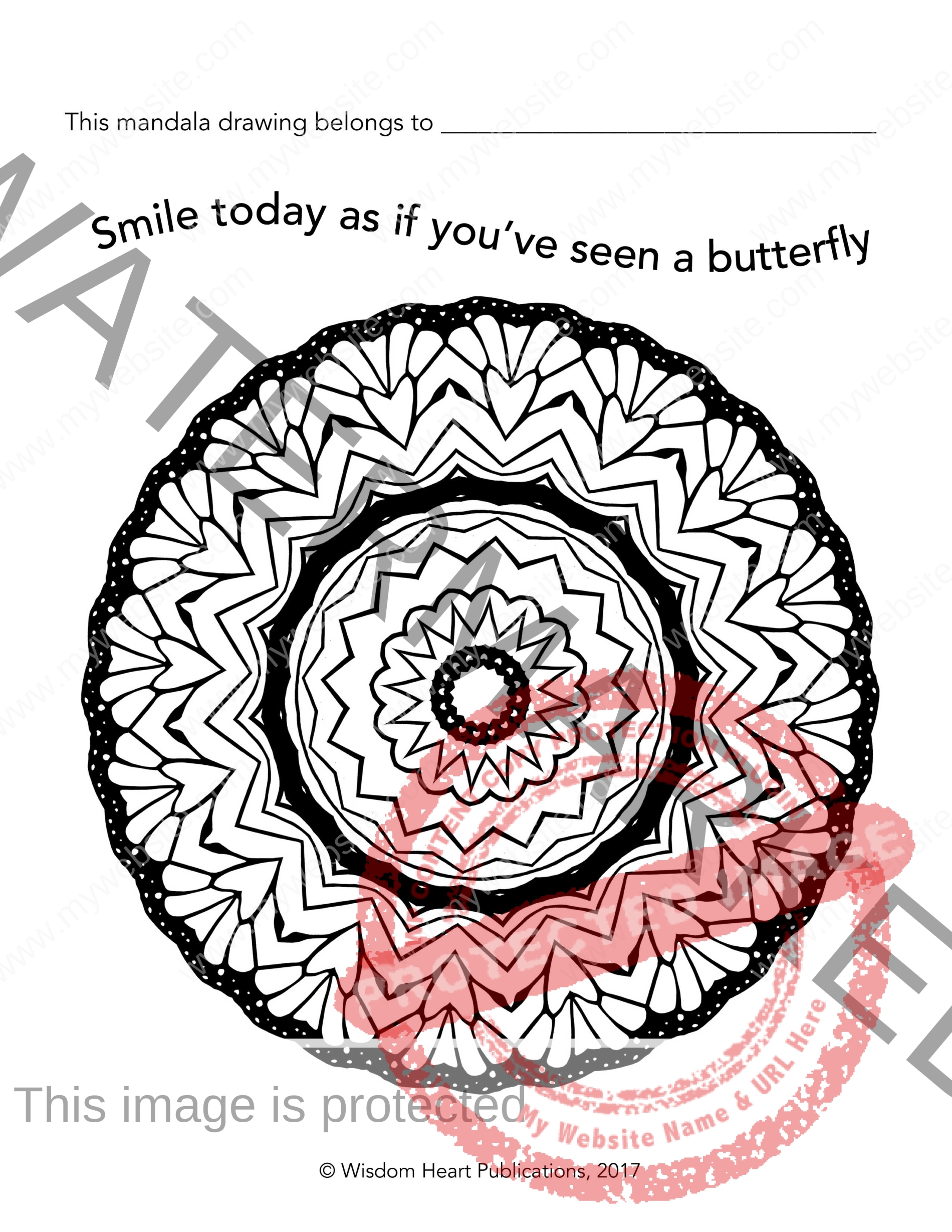
Download: Monarch High-Resolution Photograph
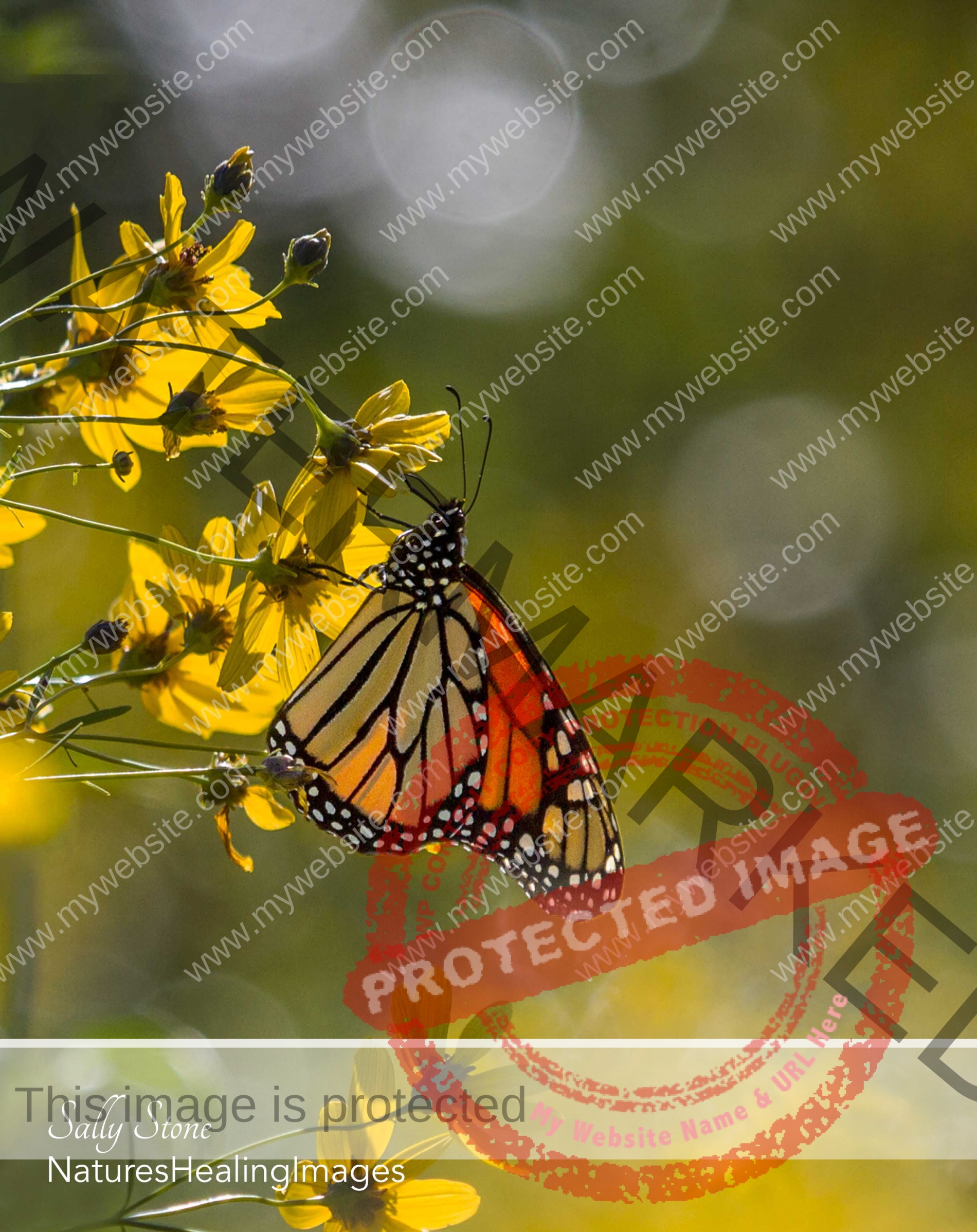
This photo is a free download.
Additional 8 x 10 fine art prints available for
$40 + shipping in the Continental US.
Click here for photo galleries and purchasing information.
Monarch Butterfly Life Cycle
Interactive Read-Aloud Unit
May, 2024: My updated interactive read-aloud unit for I Am a Butterfly is available at my Teachers Pay Teachers Store (TPT) as a free download.
A Flashcard Kit, Info Cards, and Monarch Butterflies: 8-Lesson Multiple Intelligences Unit are also available at my TPT Store.
Each resource has a preview you can look through to see if it's right for you.
The read-aloud unit includes:
- KWL organizer
- Scaffolded discussion questions
- Student-participation read-aloud ideas
- Life cycle assessments
- Bonus discussion questions
- Writing prompts.
- Links to my favorite monarch butterfly resources
Thanks for sharing your love of monarch butterflies!
~ Sally
For more info on all my monarch butterfly resources on Teachers Pay Teachers, click here.
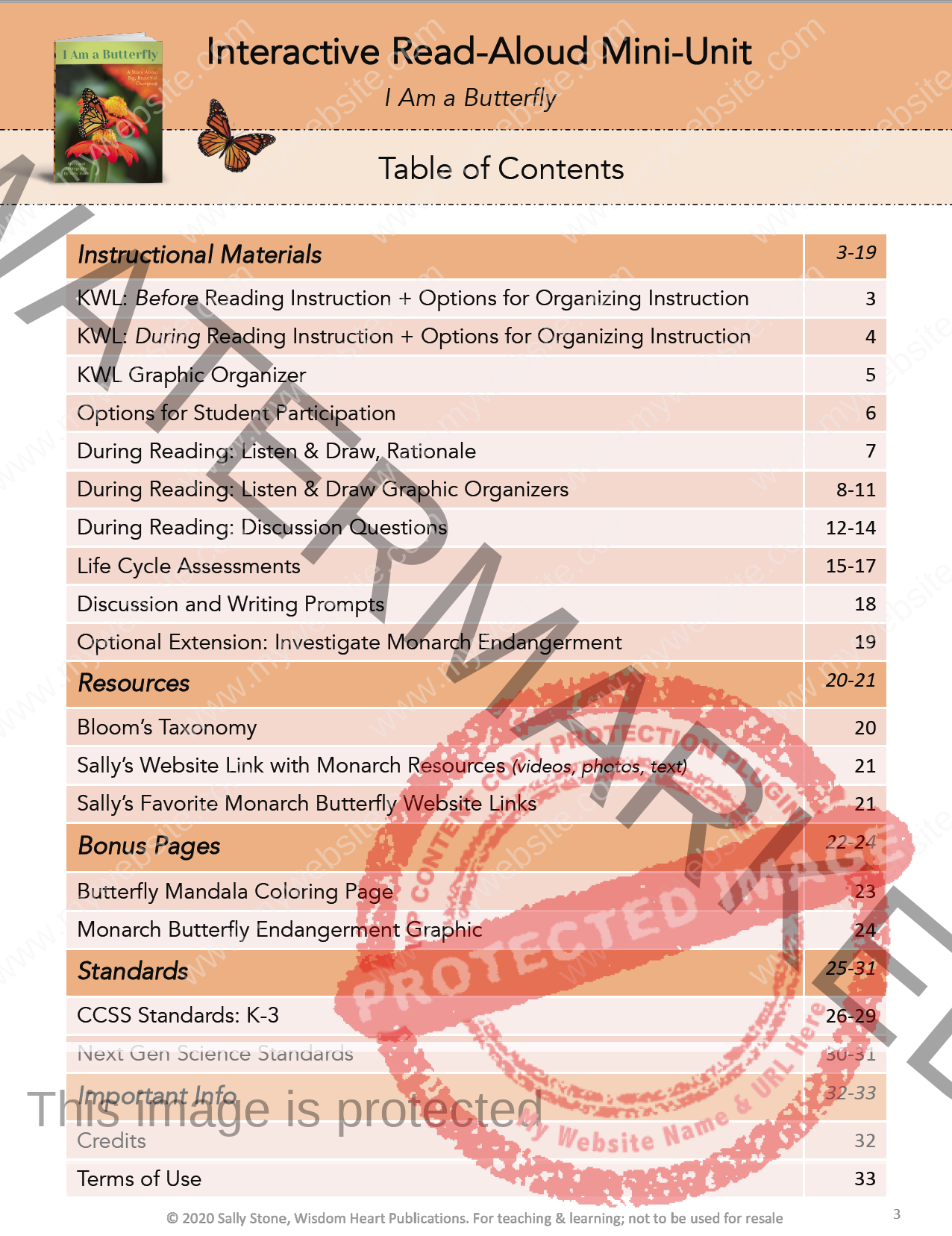
Free Downloads ©Sally Stone
*Free downloads are under copyright protection by Wisdom Heart, LLC.
These downloads may not be sold, and are provided to you for personal or classroom use. If other teachers/parents want these downloads, please share this link so they can join the community. Many thanks for your support.
© 2011 Sally Stone
Privacy Policy
Cookie Policy
email: hello@natureshealingimages.com
Some pages on this site contain affiliate links. If you choose to purchase after clicking a link, I may receive a commission at no extra cost to you.
All images on this site are the sole property of Sally Stone. These photographs are protected by copyright law and may not be downloaded, printed, or reproduced without the express written permission of Sally Stone. The photographed wildlife on this website roams free (excepting rescues in captivity for their own safety). No wildlife in these photos has been baited.

